By Zoe Barois
Like many other countries, Bangladesh is working to develop it’s Food Systems Transformation Action Plan. This will be presented during the United Nations Food Systems Summit Plus 4 Stocktaking event. On November 6 and 7, Foresight4Food collaborated with GAIN Bangladesh to host a workshop on how foresight could contribute to the development of the Action Plan.
If transforming food systems were easy, it would have been done! But it’s not. Discussions dug into deeper questions about HOW change can be brought about and the implications of this for action in Bangladesh.
The participatory and dynamic workshop brought together policymakers, researchers, youth leaders, key UN organisations and members of the private sector. The workshop served two purposes, first to help clarify directions for the Action Plan, and secondly, to take forward the work on using foresight to help drive food systems change.
Discussion during the workshop focused on the five commitment pathways:
- Nourish all people
- Boost Nature-based Solutions
- Advance Equitable Livelihoods, Decent Work & Empowered Communities
- Build Resilience to Vulnerabilities, Shocks and Stresses and
- Accelerating the Means of Implementation
Validating scenarios for the future of food systems in Bangladesh
It was great to engage in discussions around four visual future scenarios. These were developed using rich pictures during a lively multistakeholder event in June earlier this year. Future scenarios are an excellent way to open discussions around what different stakeholders see as a desirable future. Interestingly, these do not always align as the implications would vary depending on what outcomes you’re seeking. At the end of the day, a poor farmer will desire different things when compared to a corrupt businessman!
The scenarios displayed different outcomes based on these uncertainties:

Equity – Would there be high or low levels of equity?
Climate resilience – we all know that climate change is happening, but whether Bangladesh will have high or low climate resilience is definitely in question
Healthy food consumption – Would people in Bangladesh be eating traditional diets or would they follow a diet that resembles something like a North American diet, something seen in many parts of the world.
Business structure – would Bangladesh have a diversified or consolidated business structure, dominated by a few large conglomerates
Creatively naming these scenarios helps convey the messages. So we had a fun exchange where groups came up with poetic Bangladeshi names to better describe the scenarios. Part of the validation will be to update these, helping spur action towards the most desired and away from the least desired future.
Unpacking five critical issues
Key issues blocking progress towards food systems change in Bangladesh relate to:
- The cost of a healthy diet in addressing malnutrition
- Climate resilience
- The role of social protection programmes in shaping food systems change
- Fruit and vegetable production
- Land use change and dietary patterns
These key themes were the result of a longer participatory process that emerged from the food systems map of Bangladesh. Diving into these topics, FoSTr’s five research partners shared their work on the key trends, challenges, and opportunities within each theme. Exploring these themes using a future lens can help clarify desired directions of change.
The power of causal loop mapping
How often do you get policymakers, youth and researchers around one table, heavily immersed in discussion using sticky notes and flip charts? My response: not often enough! This combination of actors is rarely seen but proves oh so valuable in uncovering insights previously hidden from each sector. The tool casual loop mapping, may be familiar to some. It’s a systems thinking tool where the interconnections between elements are mapped and the direction of causality identified. It’s a great way to map out the elements within a system and identify levers of change – small actions that lead to a large impact. For each of the commitment pathways, this casual loop mapping was performed. Insights like forming alliances between farmers and entrepreneurs to boost sustainable farming practices, or using the power of advertising to improve healthy food consumption and inspire healthy lifestyles were uncovered.
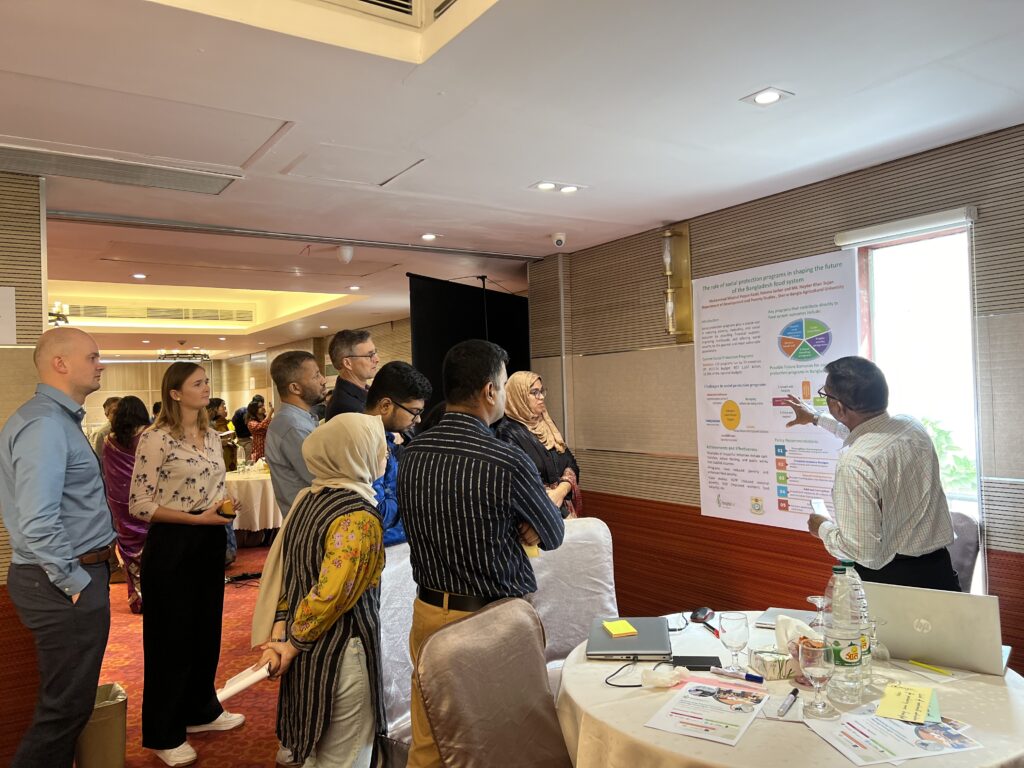
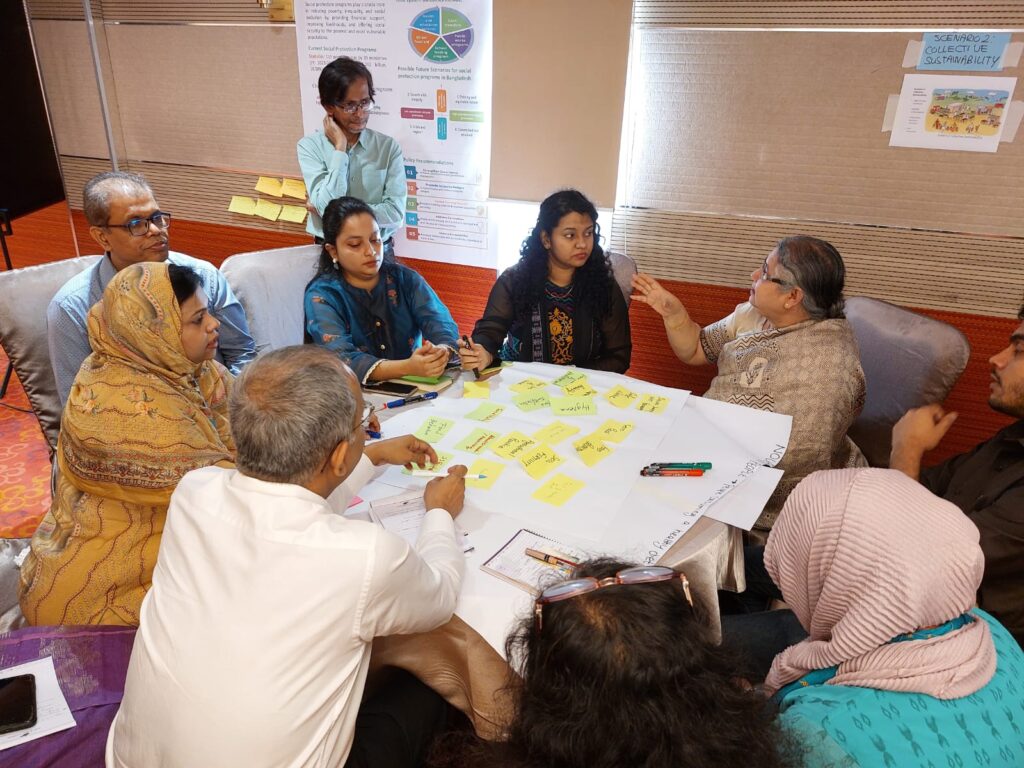
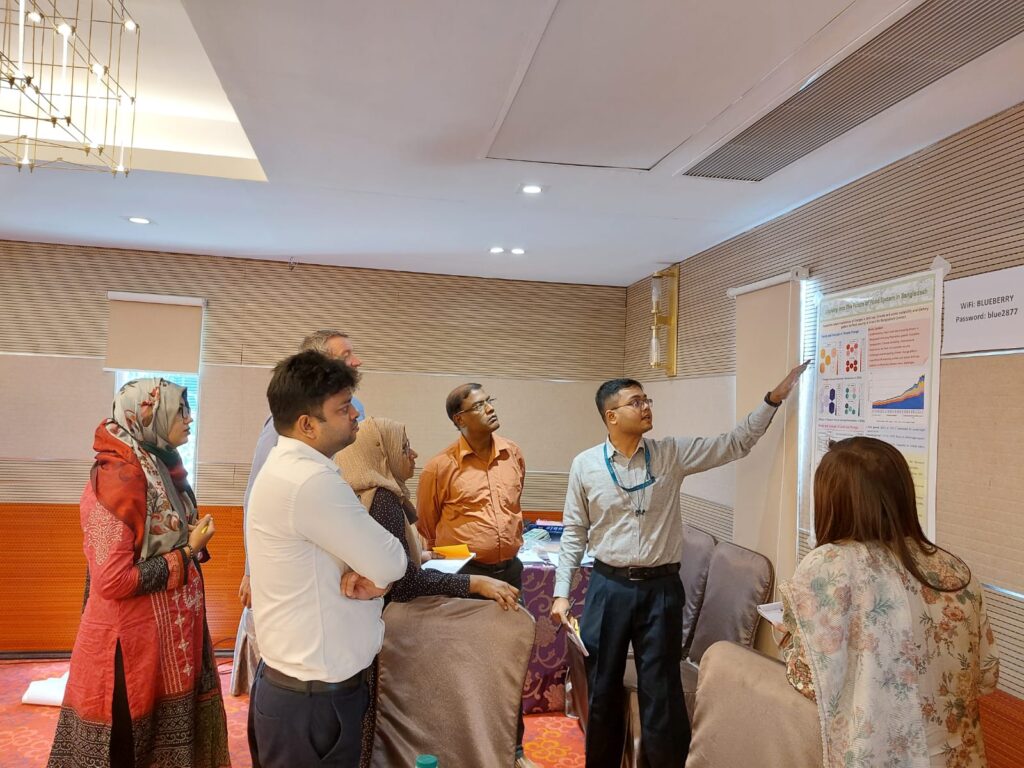
Reflections
Whilst having many people come together who don’t usually converse – the so-called ‘breaking the siloes’ is a huge achievement in itself, the task of writing yet another policy document looms above our heads. Everyone in the room has appeared here for a reason – which I hope is to create the change we need, a future that we all desire. After such positive discussions and recognition that we need to act – and act now, the fear I have is we will all fall into the same trap. The trap of being consumed by our busy agendas and becoming frustrated that yet another policy document has to be produced. Leading to un-actionable and hugely categorised actions. We don’t want this Plan of Action to become another document that has great suggestions but continues to lack the HOW. Let us think about how will these actions be implemented.
Foresight helps us to keep the bigger picture in mind, where do we want to go and where do we want to be in the future? Let’s use this thinking to help us prioritise and select key activities to implement. Working together to do so.
The Foresight for Food System Transformation (FoSTr) programme, led by Foresight4Food, is now two years into its journey of helping shape more sustainable, inclusive, and resilient food systems. With increasing uncertainties affecting global food systems—from climate change to economic challenges—the need for foresight and scenario analysis has never been more critical.

Running from 2022 to 2025, the programme is funded by the Dutch Ministry of Foreign Affairs through an IFAD grant. Based on the approach of the Foresight Framework, the programme focuses on supporting four key countries: Bangladesh, Jordan, Kenya, and Uganda.
Since its commencement, we have seen tremendous strides in advancing the key objectives of the FoSTr programme across multiple fronts. This blog highlights the progress and impact of the FoSTr programme and the exciting path ahead.
In-Country Impact: Strengthening Foresight Processes
In each of the focus countries, national foresight processes gained momentum, engaging a wide range of stakeholders, including government bodies, research institutions, and community representatives. In total, 403 individual stakeholders participated in in-country workshops across the four countries, contributing to meaningful conversations about the future of food systems.
Here is a quick overview of FoSTr programme’s progress in each of the focus countries:
Bangladesh – Strong government buy-in has been established, with collaboration from the Ministry of Food and other key players, all contributing to the national food system transformation agenda.
Jordan – Partnerships with the Ministry of Agriculture and other government entities have positioned FoSTr as a key advisor, particularly in driving forward the work of the newly established Food Security Council.
Kenya – Foresight analysis has been particularly active at both the national and county levels, with significant involvement from the Nakuru and Marsabit County governments.
Uganda – FoSTr is closely aligned with the Uganda Planning Authority, helping develop foresight tools for future food system planning.
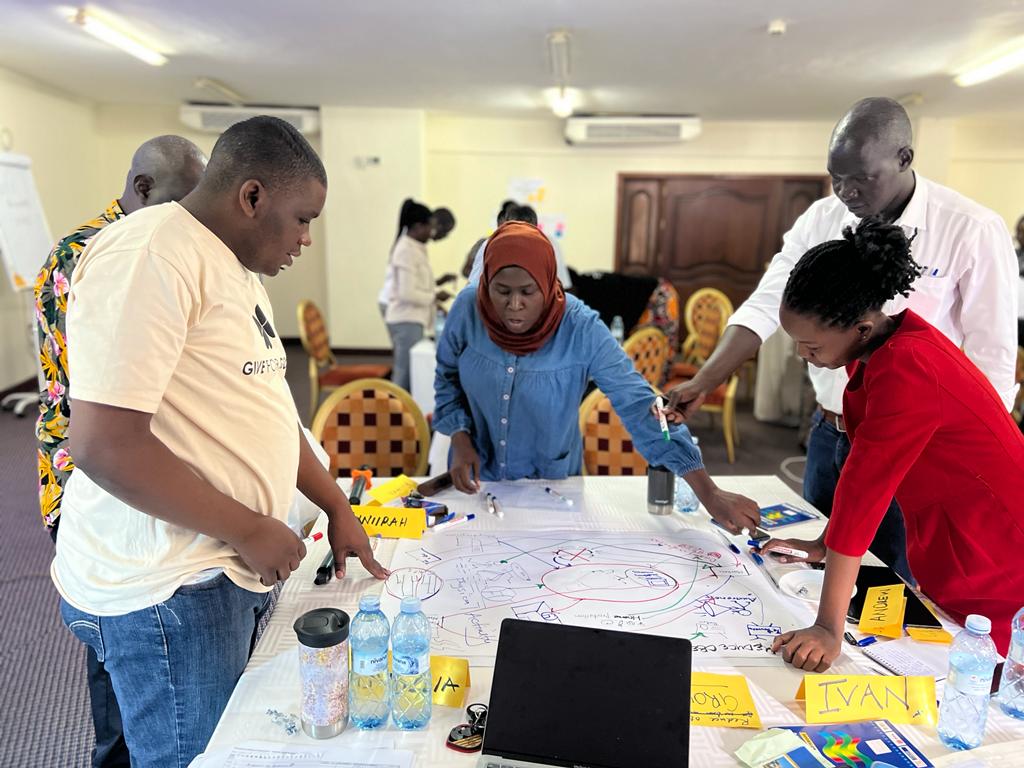
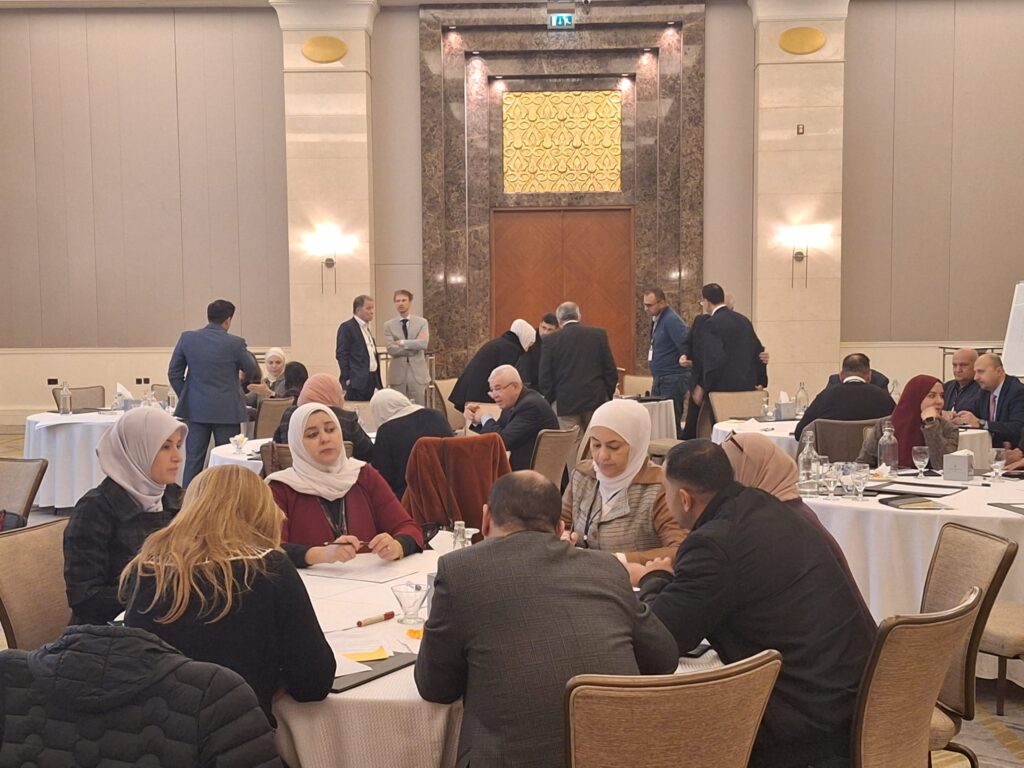
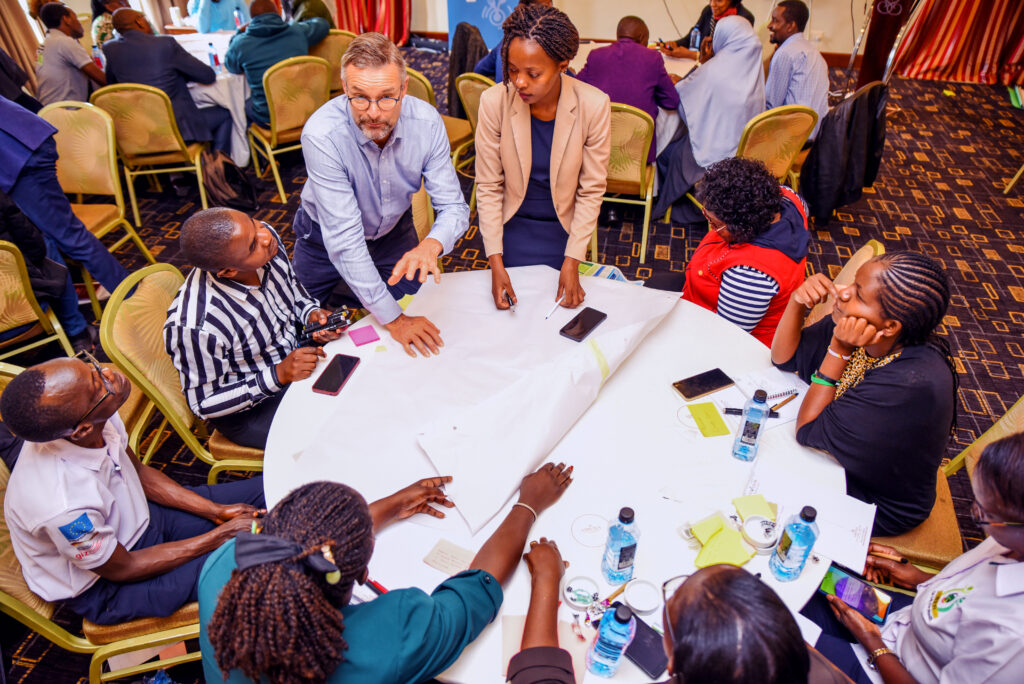
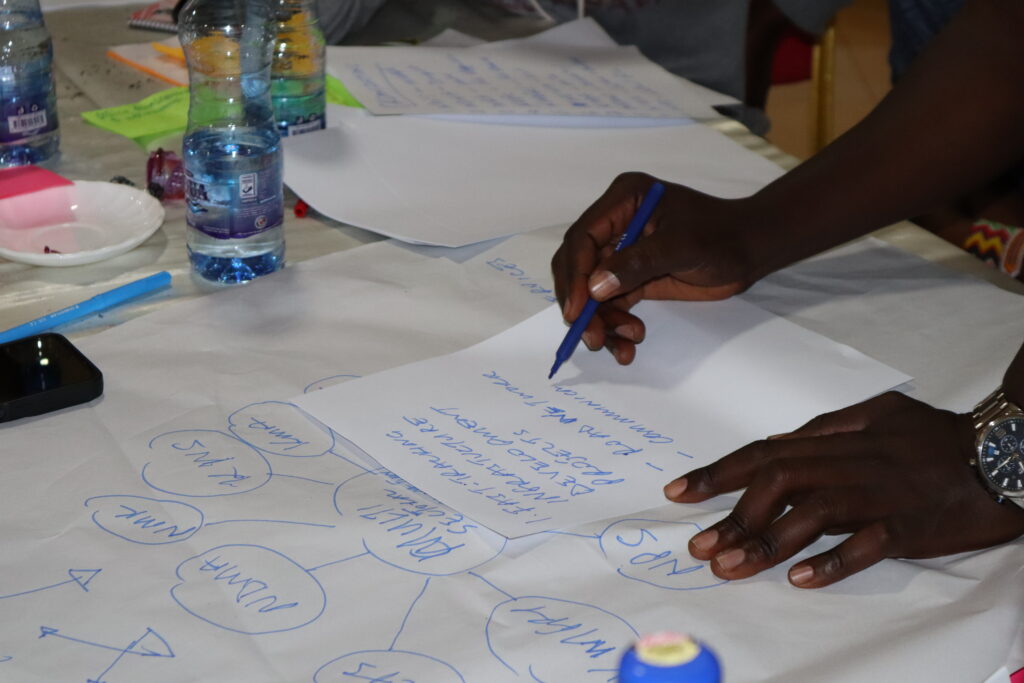


Global Collaboration: Building a Brokering Hub
On a global scale, FoSTr expanded its network of foresight and food systems practitioners, deepening collaboration across organizations like the Forum for Agricultural Research in Africa (FARA), the Global Alliance for Improved Nutrition (GAIN) in Bangladesh, and a number of renowned research institutes in the focus countries.
The work of FoSTr programme was very well-received at the 4th Global Foresight4Food Workshop in Dhaka, where more than 120 foresight practitioners from Asia, Africa, and Europe gathered to share insights on foresight methodologies and food system challenges.
Read also:
Using Foresight to Re-imagine the Future of Food Systems: Foresight4Food holds its 4th Global Meeting – by Jim Woodhill
In a highly interactive week, participants engaged in a masterclass on foresight approaches, shared their experiences and lessons, heard from thought-leaders on food systems and foresight, and identified ways of strengthening foresight practice in their own countries and regions…
A Start to the Foresight Process: Food Systems Maps
As a part of the foresight process, there is a need to have a collective understanding of the food system in different contexts. Hence, the Foresight4Food FoSTr team in collaboration with our facilitators and research partners in each focus country, created comprehensive food systems reports mapping the dynamics, trends, drivers, and activities within the food system.
These Food System Maps offer an initial snapshot of the current food system status in the focus countries and are intended to inform a more comprehensive foresight process. As the dynamics, trends, drivers, and activities within the food system continually change, these reports welcome ongoing reflection and discussion.
Knowledge Base
FoSTr also played a vital part in strengthening the Foresight4Food Resource Portal, which provides access to Foresight Studies, key data around Food System Drivers and Outcomes, a database of Foresight Initiatives, and other academic literature that helps food systems practitioners develop better Foresight Models.
The Foresight4Food Resource Portal is regularly updated with the latest research and emerging studies as well as products and resources that come out of different programme activities.
Read also:
The Complexity of Global Drivers of Food System Transformation – by Bhawana Gupta
The global food system needs to be transformed. It needs to deliver better health and improved livelihoods while protecting the environment and minimizing negative social impacts. However, there are many interconnected factors playing a role. Food Systems are complex…
Overcoming Challenges
Like any ambitious programme, FoSTr encountered its share of challenges. These included navigating political instability in some focus countries. Meanwhile, navigating the political economy of food systems—especially where entrenched power dynamics and vested interests are at play—required FoSTr to strike a delicate balance between supporting ongoing policy processes and introducing more transformative ideas for change.
The Way Forward
As the Foresight4Food FoSTr programme enters its third and final year, several key objectives will guide the remaining activities:
Brokering Foresight Processes: Continue to build connections with national stakeholders and existing initiatives, ensuring that foresight insights are integrated into policy-making and planning processes.
Capacity Building: Organize intensive face-to-face training workshops to further enhance foresight facilitation skills and broaden participation from underrepresented groups, including the private sector and youth.
Scenario Analysis and Policy Recommendations: Complete the ongoing scenario analyses and translate these into clear policy recommendations that will guide national food system transformation agendas.
Sustaining Momentum Beyond 2025: Establish sustainable communities of practice that can continue to drive foresight activities beyond the programme’s official end.
Conclusion: A Transformative Journey
In an era where global food systems are under immense pressure due to climate change, population growth, and shifting socio-economic landscapes, forward-thinking approaches are critical to ensuring food security and sustainability.
The Foresight4Food FoSTr programme has made significant headway in its mission to advance food system foresight processes in Bangladesh, Jordan, Kenya, and Uganda while building a broader global network of foresight practitioners. As we look ahead to the final year, the focus will be on translating foresight insights into action, empowering national stakeholders, and ensuring that the work of FoSTr continues to have a lasting impact on food systems worldwide.
Bonus: FoSTr Facilitators Insights
As the Foresight4Food FoSTr programme continues to foster systemic change in global food systems, the programme facilitators will be sharing their observations on the work and progress of FoSTr programme in their respective countries through insightful blogs. Watch this space and our social media channels for more updates.
By Bram Peters
The Foresight4Food FoSTr team has just returned from an active and productive trip to Kenya, despite the challenging political situation in the country. From our perspective, this highlights the need to adapt to turbulence and to use foresight to build resilience for Kenya’s food system.
From June 19 to 26, together with my team members including Jim Woodhill, Herman Brouwer, and Wangeci Gitata-Kiriga we conducted a range of food systems foresight workshops in Nairobi and Nakuru with a wide range of national food systems stakeholders. Here is a brief update on the action.
Navigating turbulence
On the morning of June 19, Foresight4Food, together with partners ILRI–CGIAR, Results for Africa Initiative and University of Nairobi, organised two sessions in Nairobi. The interactive breakfast session was all about ‘Navigating agri-business in turbulent futures’. The session was co-hosted by IFAD Kenya and was attended by a range of private sector associations, business support services, innovation facilitators and impact investors.
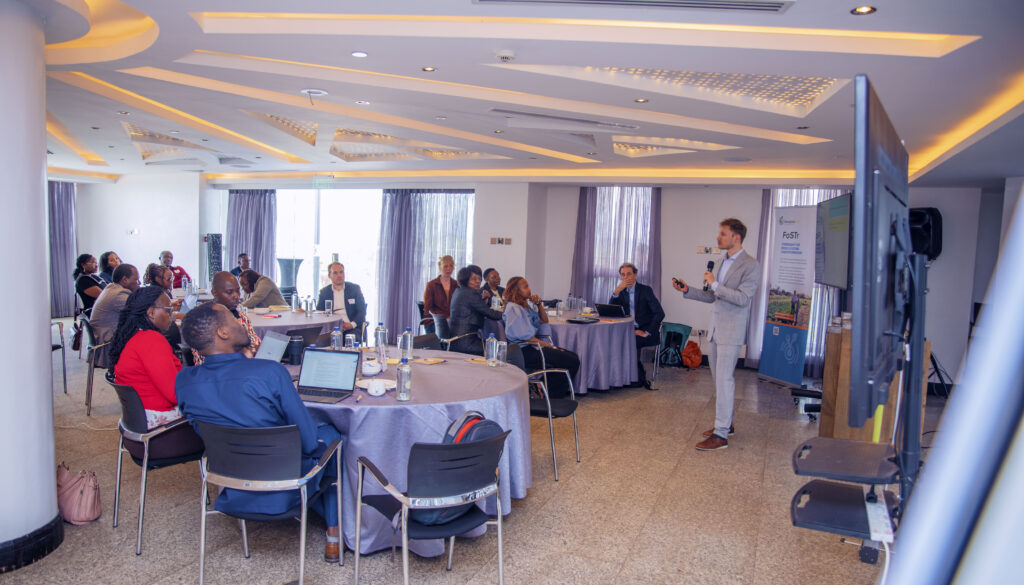
The focus of the meeting was to introduce the topic of foresight in relation to agribusiness in Kenya, share some of the scenarios that were developed in the context of Nakuru, and discuss the implications of different futures of the food system. Participants were shown five different scenarios of how the food system might look in 2040 in Nakuru and were invited to think through and discuss the implications of these scenarios.
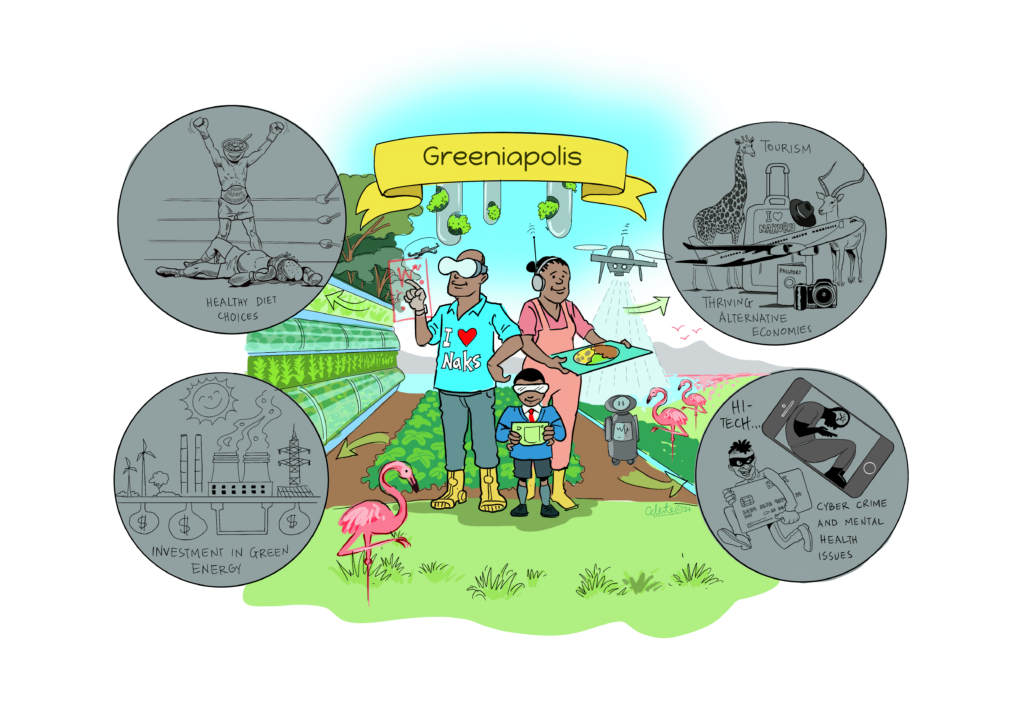
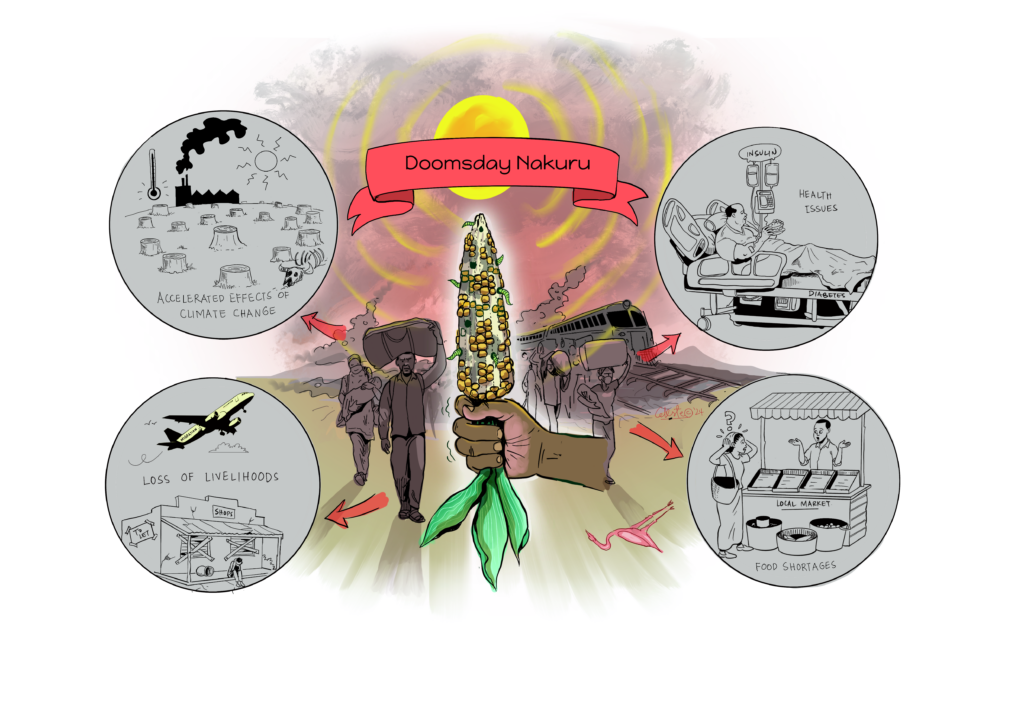
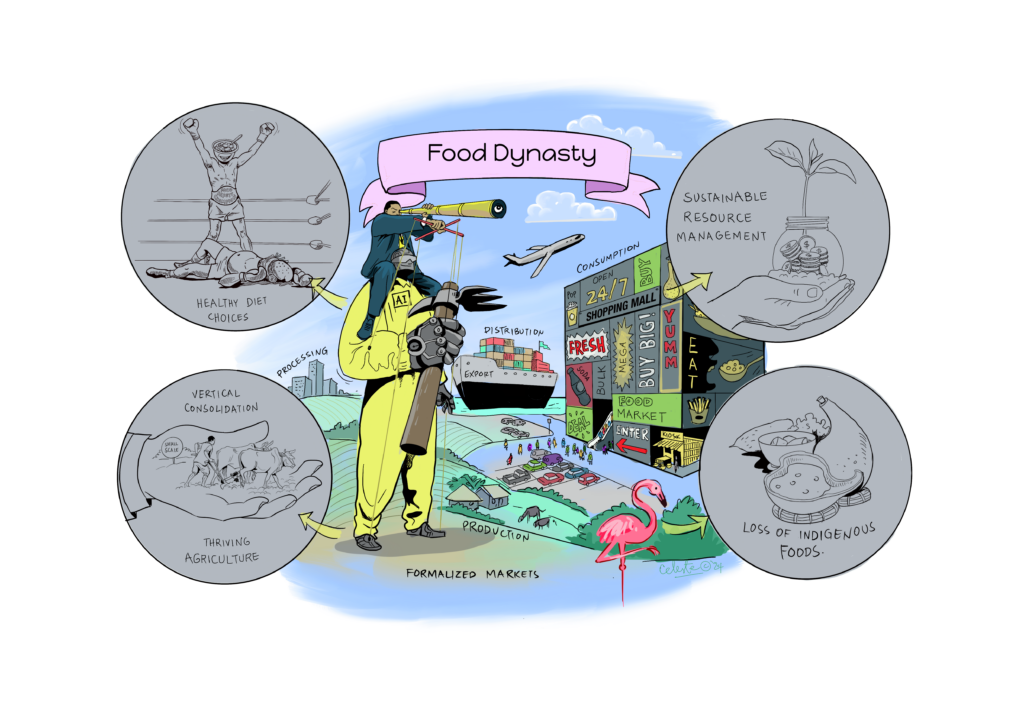
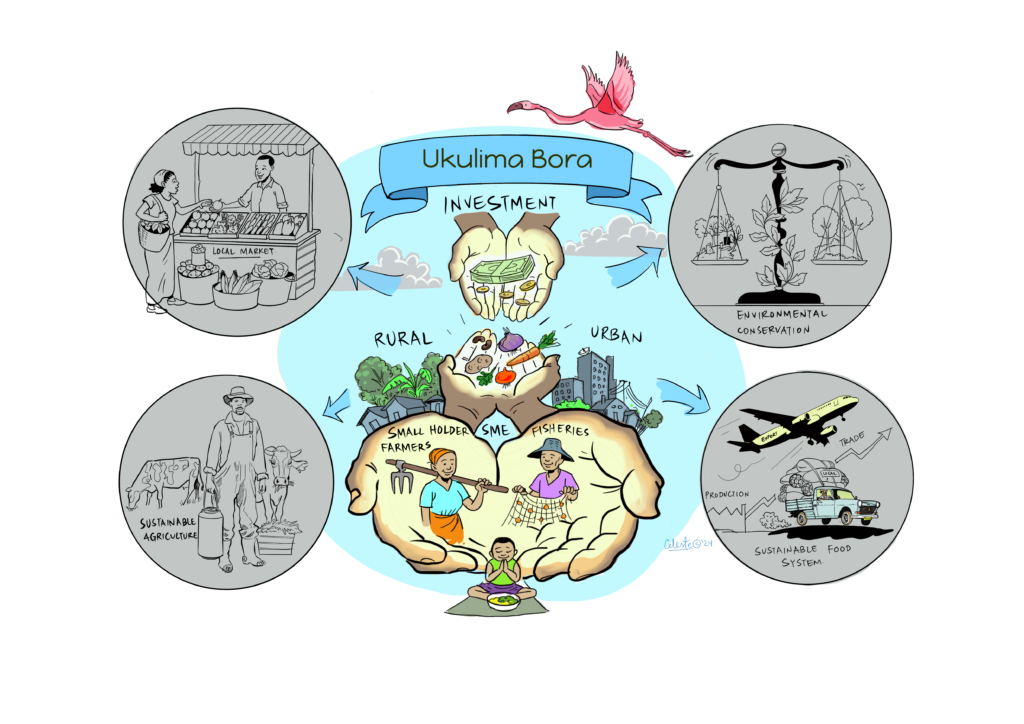
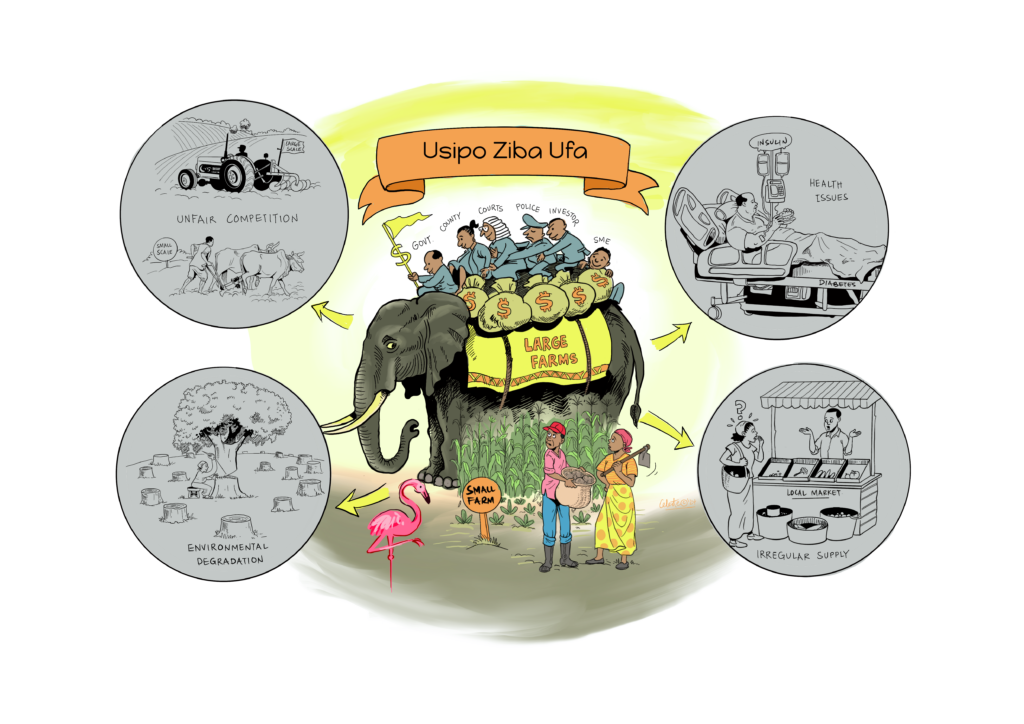
With a strong presence and involvement of leaders from various private sector associations such as the Agriculture Sector Network (ASNET) of the Kenya Private Sector Alliance, the discussion invited stakeholders to reflect not only on trends and uncertainties emerging in Kenya, but also how their own businesses are preparing for the future.
Supporting the pathways for food system transformation
In the afternoon of June 19, the FoSTr team organised a national update session on the progress of FoSTr since June 2023. The session was attended by many individuals from the morning session, as well as representatives from government, civil society and research organisations. The FoSTr team presented the latest updates, including the launch of a ‘Kenya Food Systems Mapping Report’, and with a collection of scenarios for the Nakuru food system.
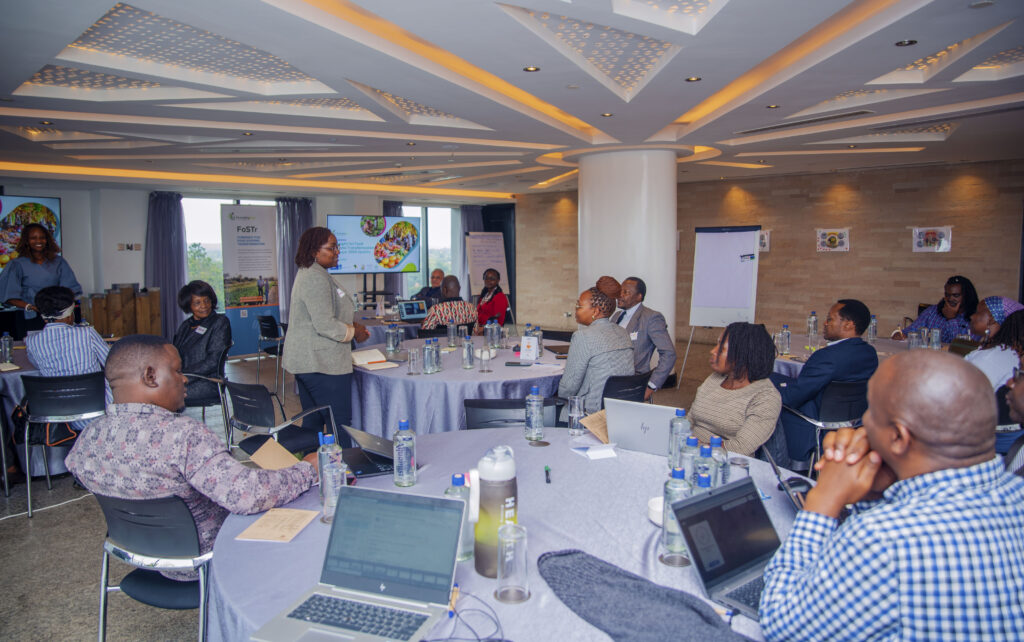
With a special presentation by the Ministry of Agriculture and the Food Systems Technical Working Group and special remarks from IFAD on the 3FS tool, it was discussed how a wide range of ecosystem support initiatives are buttressing the national food systems transformation pathways in Kenya. The approach by Foresight4Food to engage with two counties, Nakuru and Marsabit, and to build on Bottom-up initiatives showed how our approach complements the ongoing national-level initiatives.
Systemic Theory of Change
From June 19 to 21, the Foresight4Food FoSTr team facilitated a 3-day workshop for the inception phase of the new Netherlands-funded, World Food Programme and UNESCO on ‘Sustainably Unlocking the Potential of Lake Turkana. Stakeholder representatives from the Lake Turkana region (both on the Marsabit and Turkana sides of the lake) gathered in Nairobi to engage in a shared analysis of the complex food system and co-create the high-level focus of the programme.
The Turkana Lake food system is highly complex, with high food insecurity, vulnerability to climate change and conflict, and many cultural dynamics around pastoralist and fisheries livelihoods. Finding market opportunities and strengthening resilience is not easy, and requires a different way of working. Using the Foresight4Food approach, and building on 6 scenarios that were developed in previous workshops in Marsabit and Turkana, stakeholders explored what might need to be done to understand systemic risks and how lasting opportunities can be triggered.
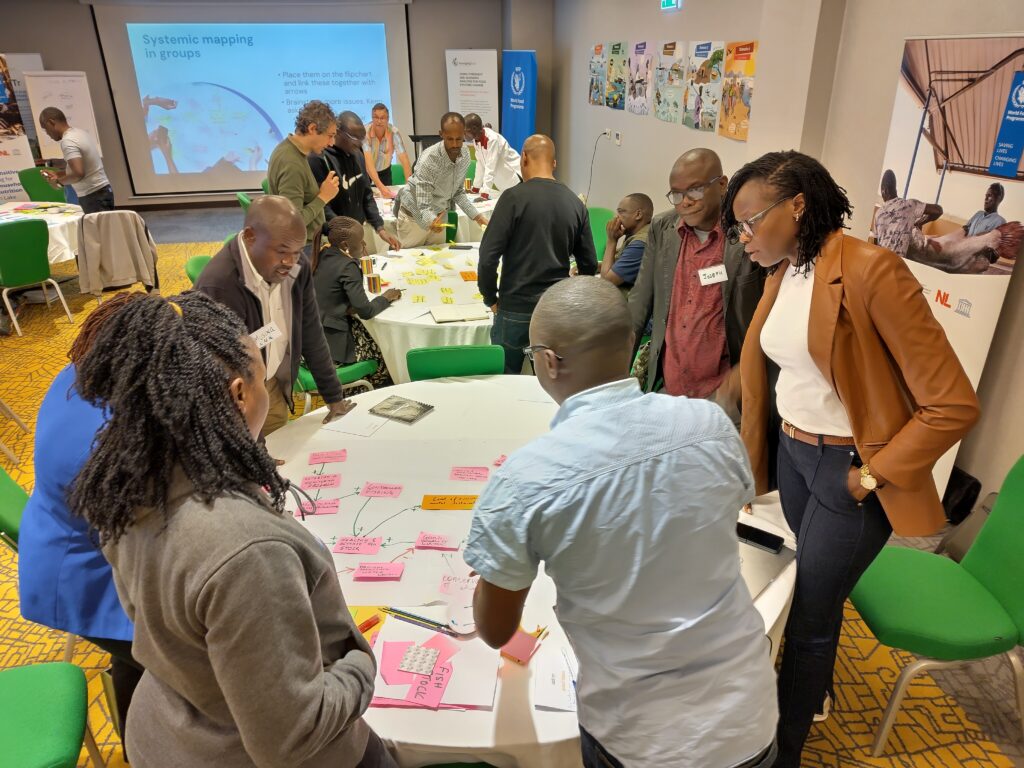
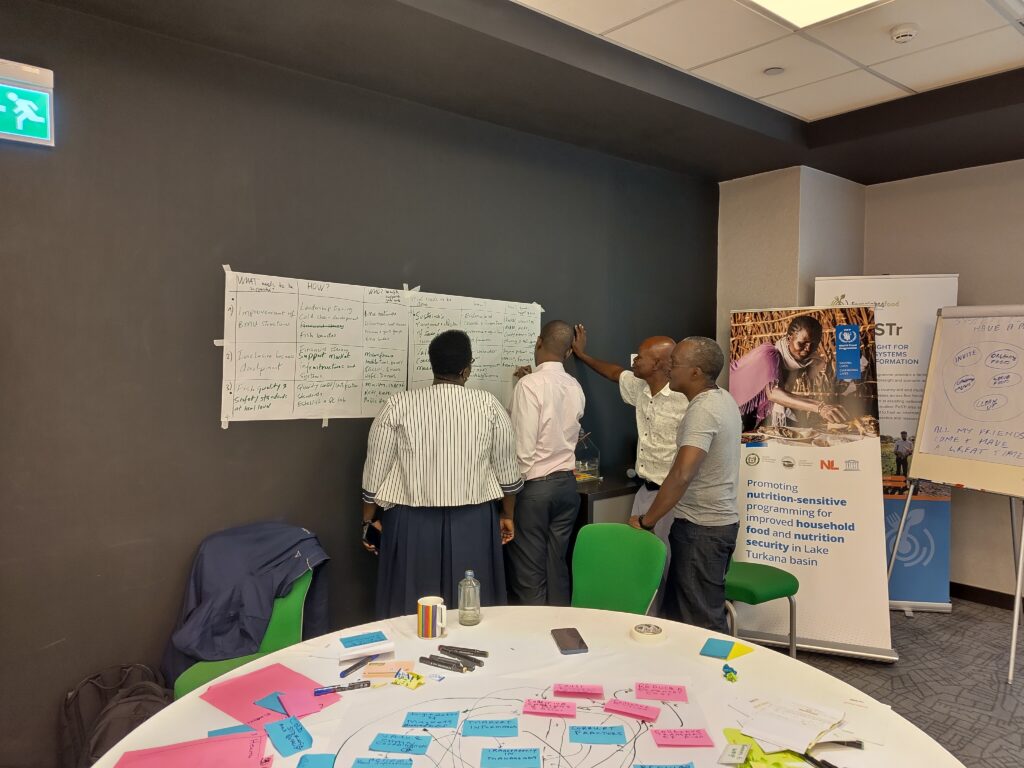
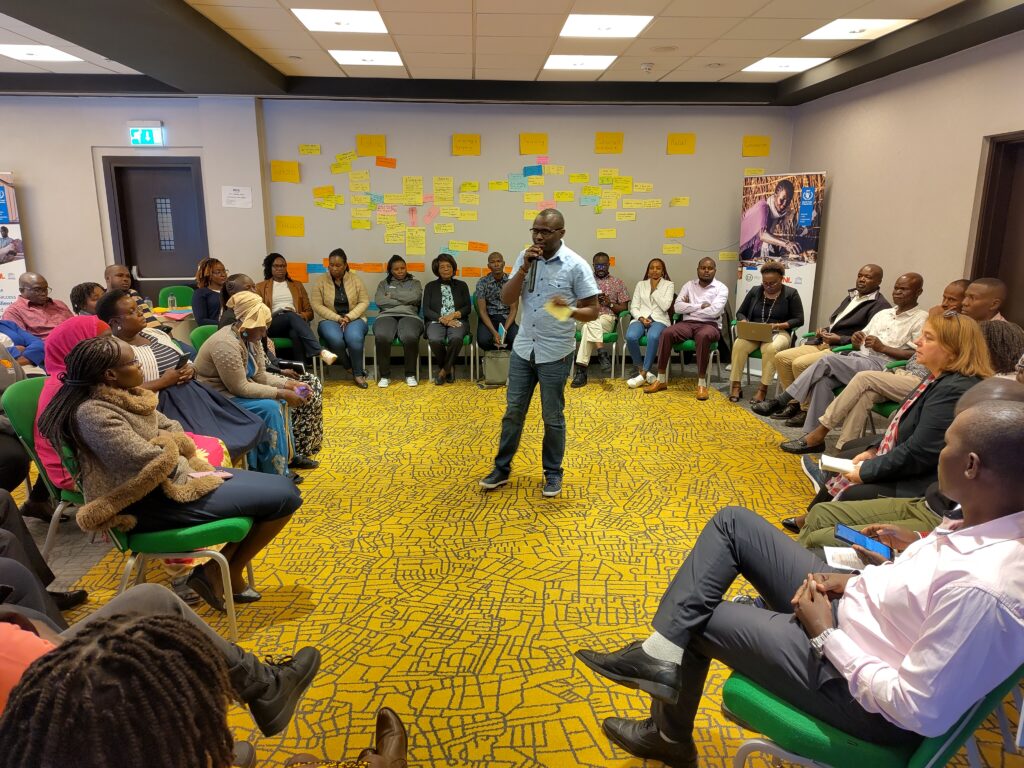
Preparing a Systemic ToC is all about analysing the context, articulating the transformations needed in light of various future scenarios, and developing the building blocks for action. The building blocks include pathways, processes and partnerships. Through many interactive discussions and exercises, the stakeholders conducted value chain mapping of the fish value chain, CATWOVE for articulating systemic change narratives, and Causal Loop Mapping.
Manifesto for Change for the Nakuru Food System
On June 24 and 25, the FoSTr team including partners ILRI-CGIAR, Results for Africa Initiative and University of Nairobi once again visited Nakuru, now to explore systemic change pathways. As we already noted from previous workshops, the food system of Nakuru County is full of potential, as Nakuru’s natural resources are rich and a wide range of agricultural value chains are represented. However, challenges related to food and nutrition security and environmental sustainability exist. Trends of climate change, unhealthy diets and land fragmentation are appearing. The future holds many uncertainties. In order to future-proof the food system, it is urgent that investments are made to further enhance the resilience and sustainability of food and agriculture in Nakuru.
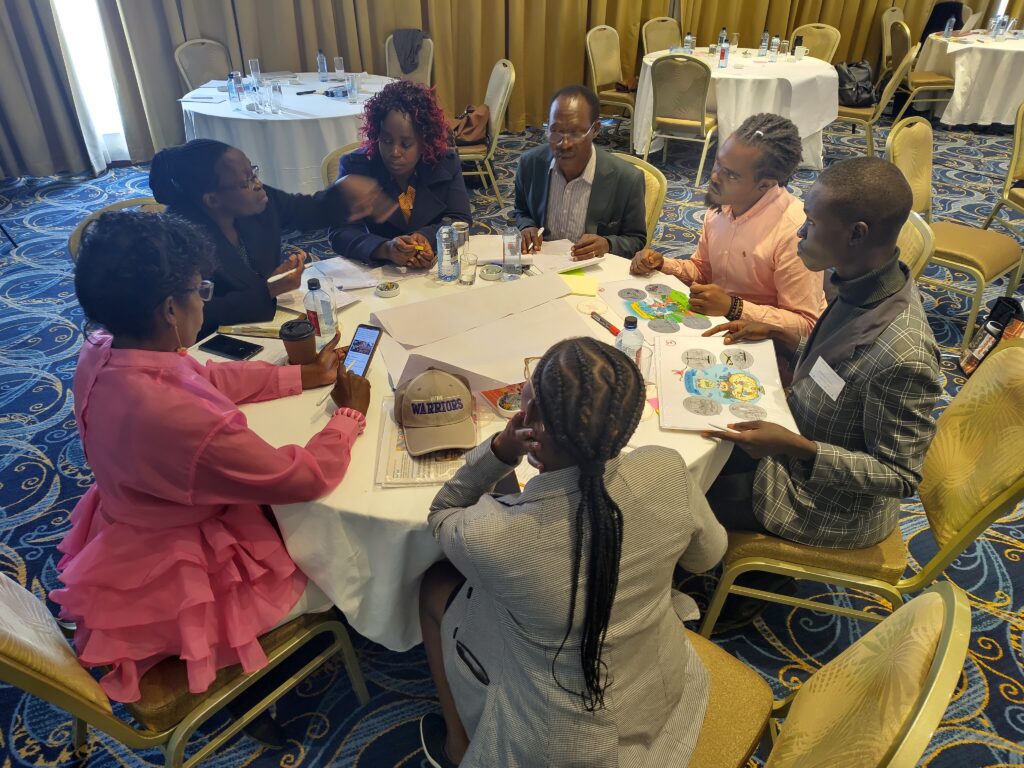
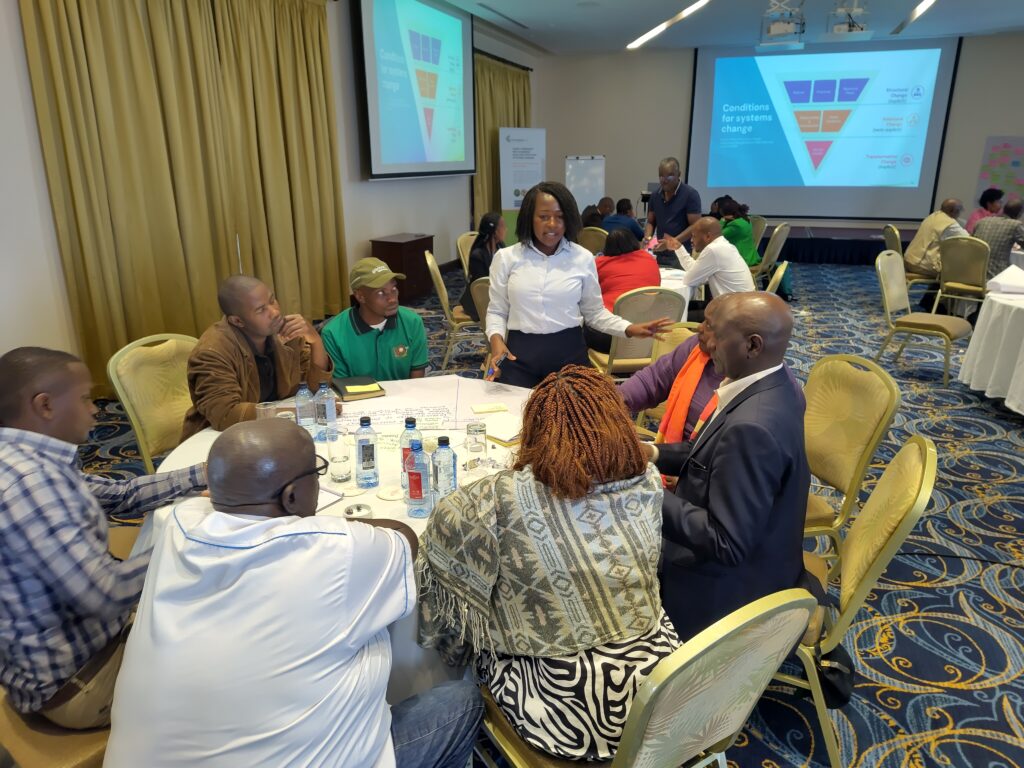
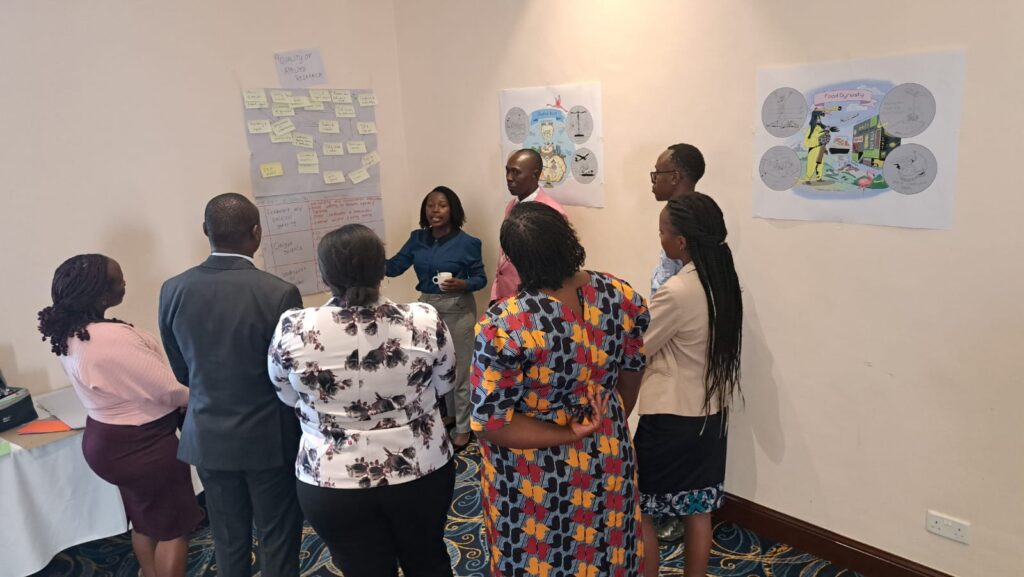
Since November 2023, a diverse group of more than 40 different stakeholders from Nakuru county have been coming together to consider the future of food system, supported by researchers and facilitators of Foresight4Food. This inclusive group looked at the challenges and opportunities for food and agriculture today and how they might evolve in 10-15 years. Food system analysis, an assessment of drivers and trends relevant to Nakuru, and 5 scenarios were developed by this group.
During these two days, stakeholders from Nakuru engaged in scenario interpretation and Causal Loop diagramming to come up with key pathways to kickstart food system transformation in Nakuru. These outputs culminated in a Manifesto for Change: a vision for the desired future for Nakuru’s food system and a range of possible pathways that can set us in that direction, while preparing us for a range of uncertainties. The Manifesto calls upon all stakeholders to join and align their actions, and intensify collaboration to transform Nakuru’s food system so that it can feed its people nutritiously; advance economic development; restore balance with nature; grow in-county revenue and eventually GDP growth for Kenya.
by Bram Peters
As a part of the FoSTr programme, the Foresight4Food team organized the “Exploring Alternative Futures for Jordan’s Food System” workshop in Amman, Jordan that brought together food systems stakeholders in Amman to discuss the future of Jordan’s food security. Here are some of the observations and insights from the event.
With themes of resilience, adaptation, action, and collaboration, participants engaged in scenario planning and back-casting exercises to anticipate challenges and shape future outcomes. Key uncertainties like water availability, healthy diets, regional trade, and business structures were explored through four scenarios set in 2040. These insights, supported by quantitative modeling, fostered rich discussions about desirable futures and the actions needed today to create a sustainable, resilient food system for Jordan.
During the workshop, colleagues from the University of Jordan and Jordan University of Science and Technology presented four policy briefs. These were: Food Loss and Waste, Water-to-Food Conversion, State of Smallholder Farming in Jordan and Malnutrition. Each policy brief captures the state of knowledge and offers recommendations to explore how to address these issues from a food systems perspective.
The FoSTr team introduced four critical uncertainties that will be highly important and uncertain to the long-term future of the Jordan food system:
- The extent of fresh water available to agriculture
- The extent to which healthy diets are adopted
- Level of ease of regional trade
- The type of business structure the food system will have
Each of these uncertainties was combined to offer four scenarios, taking place in 2040, up for discussion with the participants. Supported by insights from quantitative simulation modelling, the implications on food systems outcomes were explored in each scenario. Some scenarios described that the people of Jordan adopt healthy diets despite a challenging regional trade situation. In others, severe limitations on fresh water for agriculture were seen in combination with a highly corporate-led food system.
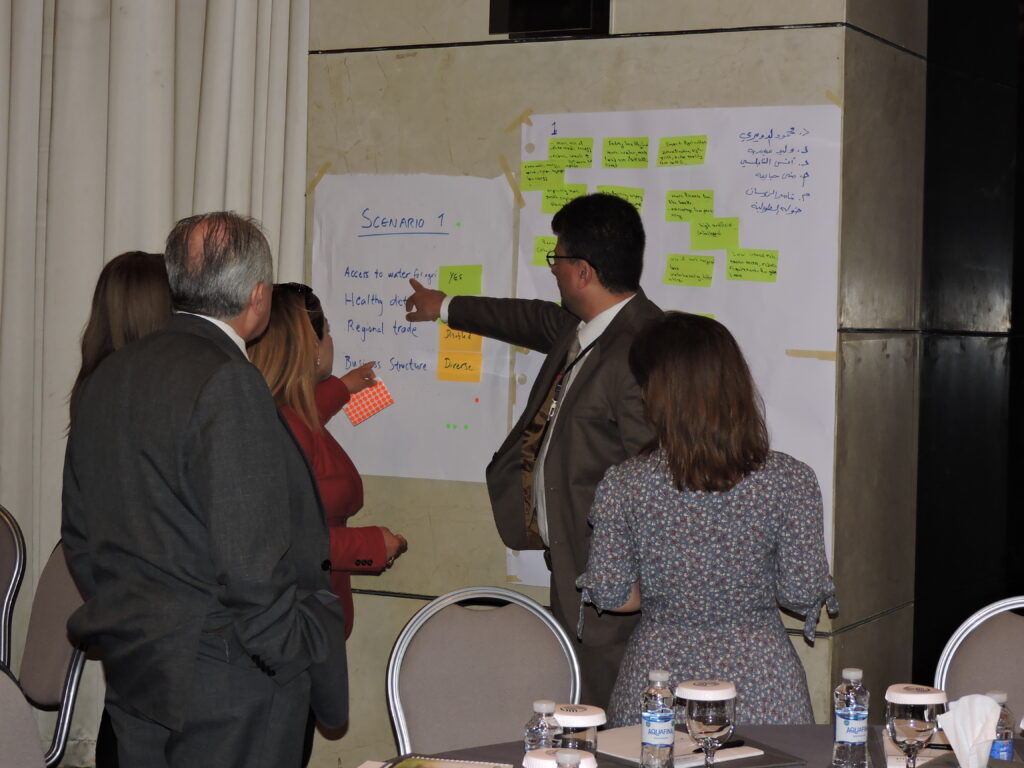
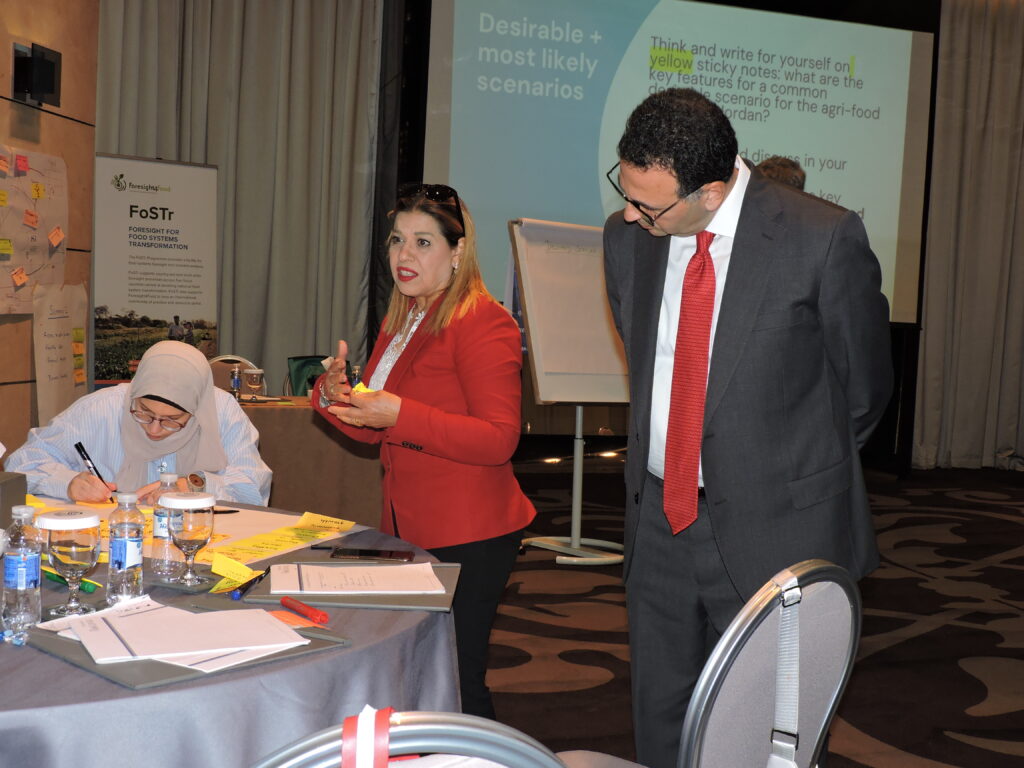
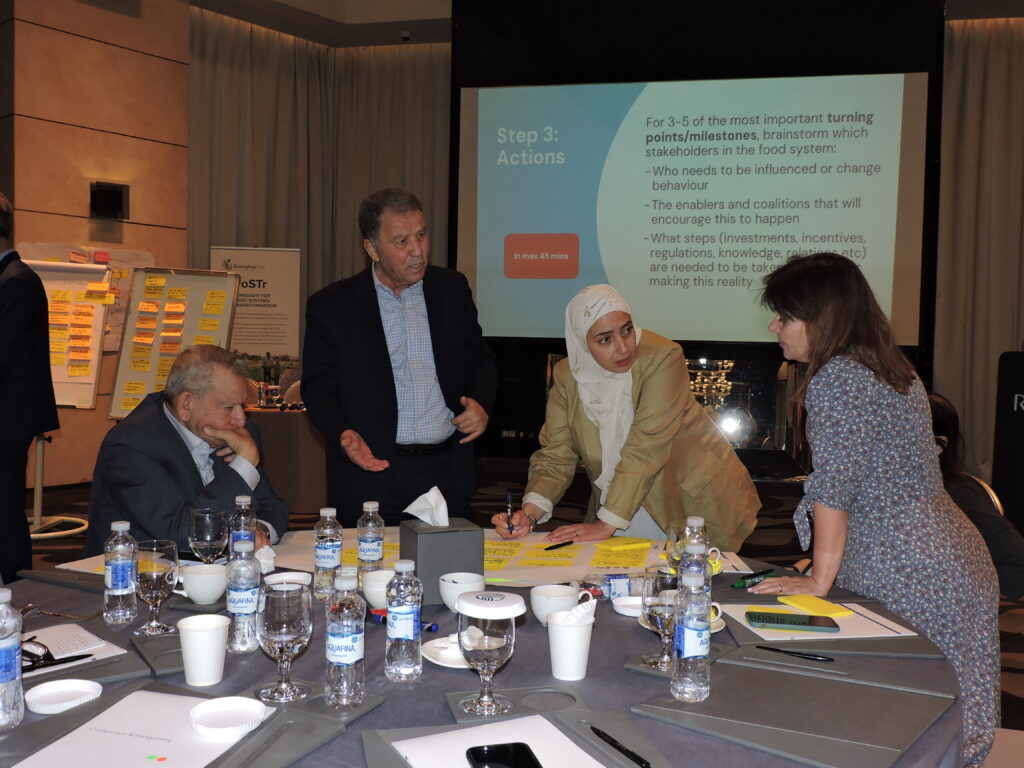
Additionally, the participants explored how that situation might look in each. These scenarios served to open up minds towards the possibility of different situations emerging in the future and highlight the need for anticipatory action and systemic change.
The scenarios led to a discussion of what might be the ‘most likely‘ and ‘most desirable’ scenarios for the Jordan food systems stakeholders. The outline of a desirable future, informed by trends and uncertainties, was formulated to serve as a guiding star. A back-casting approach was used to then explore what events and turning points might occur between 2040 and now to realise that desired future. Based on this timeline, stakeholders brainstormed a range of different actions and stakeholders which are needed now, to already start pushing the system towards the Desired Future.
Building on the encouraging shared co-ownership of the results of the workshop, the Foresight4Food FoSTr team will continue efforts to develop policy briefs, deepen the action areas that were developed, and support the Food Security Council of Jordan in proving the underpinnings for the ongoing work on national food systems transformation.
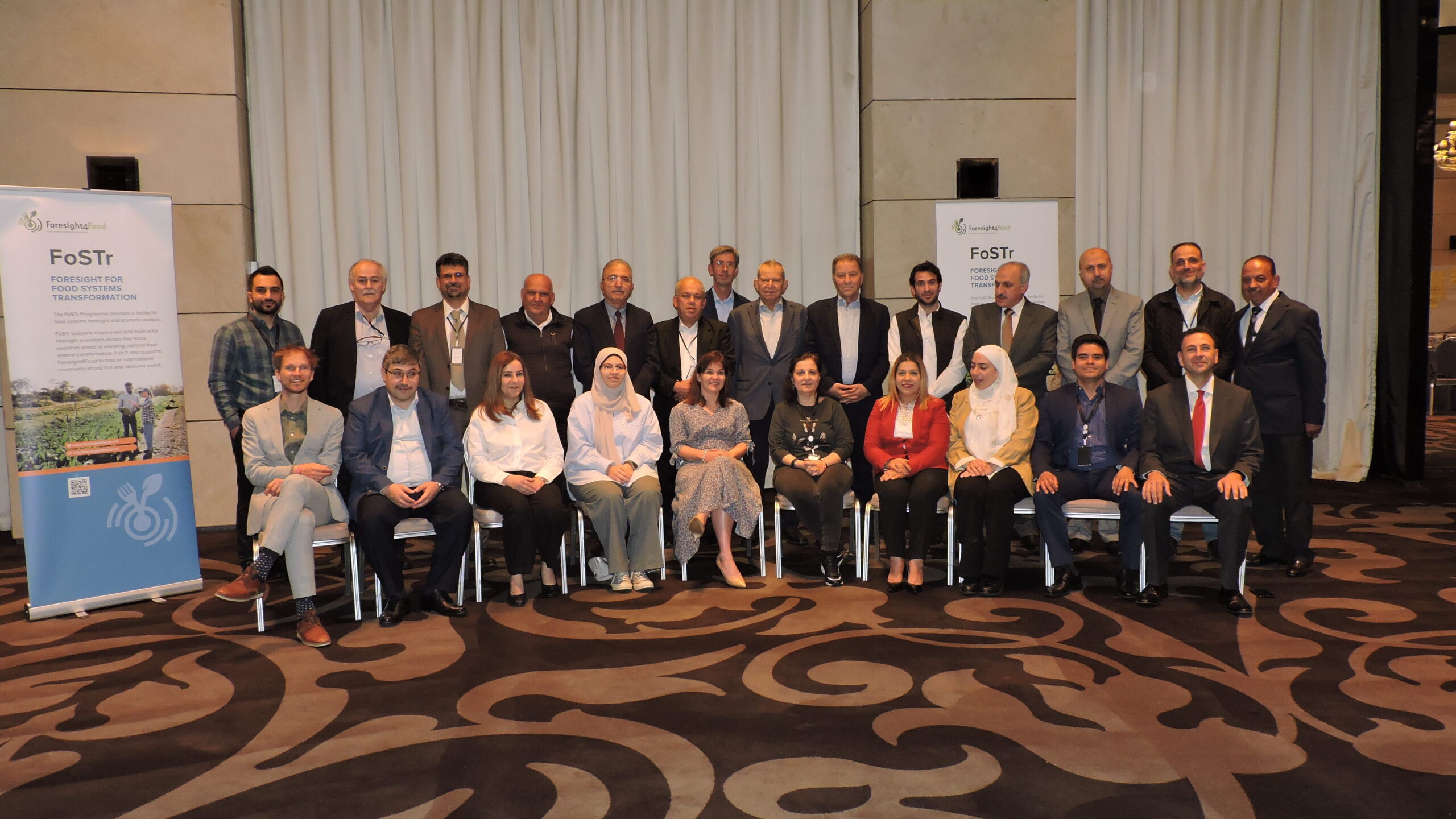
Foresight4Food is organizing its 4th Global Workshop in June titled “Reframing Food Futures: Making Foresight Transformative”. To raise the tip of the curtain on this exciting event, we have asked Mohammad Monirul Hassan, Foresight4Food Country Facilitator and Global Alliance for Improved Nutrition (GAIN) Advisor, to share some of his thoughts and expectations. Here is what he has to say:
As a food systems practitioner, what keeps me up at night
Bangladesh has made significant progress in food security and nutritional status over the past decade, with a growth rate of food production much higher than population growth. The country’s food grain production self-sufficiency has been sustainable and stable, and access to food has improved over time. However, the country still faces challenges in ensuring food and nutrition security for its growing population of around 170 million, projected to reach over 186 million by 2030.
The recent COVID pandemic and the subsequent Russian-Ukraine war have put enormous pressure on the food supply in the country, as Bangladesh is a net food importing country. We have achieved self-sufficiency in rice and some other products; however, the country is still dependent on wheat imports, edible oil, lentils, pulses, and spices. Due to the depreciation of Bangladesh’s Taka against the US Dollar, import costs have increased significantly which impacted the price of commodities both in the food and non-food sectors. The lower-income households are struggling to meet daily needs due to income losses and price hikes.
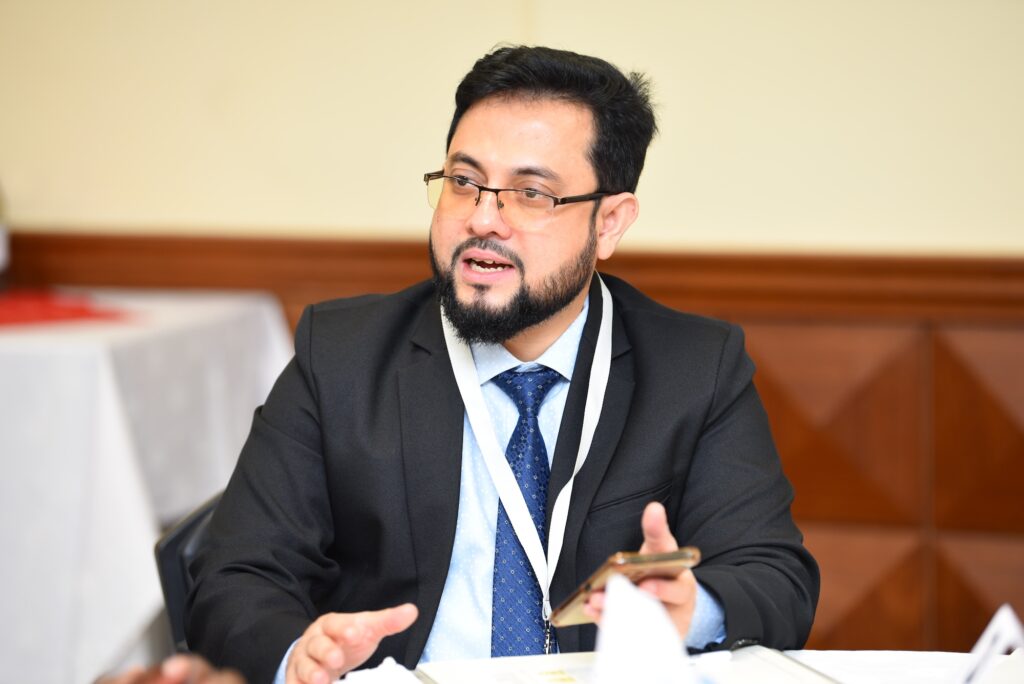
The recent COVID pandemic and the subsequent Russian-Ukraine war have put enormous pressure on the food supply in the country, as Bangladesh is a net food importing country. We have achieved self-sufficiency in rice and some other products; however, the country is still dependent on wheat imports, edible oil, lentils, pulses, and spices. Due to the depreciation of Bangladesh’s Taka against the US Dollar, import costs have increased significantly which impacted the price of commodities both in the food and non-food sectors. The lower-income households are struggling to meet daily needs due to income losses and price hikes.
As a Bangladeshi citizen and a food systems practitioner, a thought that concerns me is that the emerging negative trends and uncertainties like climate change, population growth, income inequality, agricultural labor scarcity, and barriers to access to safe and nutritious food may push back the decade-long achievement of the food and nutrition security of the country in the long run.
Climate change adaptation is the key priority in Bangladesh. Bangladesh is one of the most vulnerable countries in the world to climate change impacts. Developing climate-resilient technologies that exhibit tolerance to drought, flood, heat, cold weather, and salinity can help mitigate production losses caused by the frequent occurrence of extreme weather patterns anticipated due to climate change. Alongside conventional staple crops like rice, wheat, and maize, more focus is given to advancing technologies for protein-rich crops such as pulses and beans, as well as vitamin-rich fruits and vegetables. Enhanced breeds of cattle and poultry that possess the ability to endure harsh climatic conditions are being developed.
The focus is given to enhancing productivity through advances in crop, livestock, and fisheries management, either individually or in combination with genetic enhancements. Improved management methods in agriculture can enhance profitability for producers while also promoting sustainability by optimizing the use of inputs such as seeds, fertilizers, pesticides, and water, and lowering the environmental impact of farming. To improve the food and nutritional situation, more emphasis needs to be placed on coordination, enhancing partnership and policy coherence, and strengthening implementation means.
FoSTr’s support in Bangladesh’s vision of sustainable food systems
Food system transformation is high on the political agenda in Bangladesh with the formulation of the National Food and Nutrition Security Policy 2020, its Plan of Action (PoA) 2021-2030, National Agricultural Policy 2018, and Bangladesh’s contribution to the UN Food System Summit 2021 and the UNFSS +2 Stock Taking Moments (STM). Bangladesh has outlined its “Making Vision 2041: A Reality-Perspective Plan of Bangladesh 2041”, Dhaka Food Agenda 2041, Smart Bangladesh Vision 2041, and the Bangladesh Delta Plan 2100, which depict the country’s aspiration and preparation towards a developed nation.
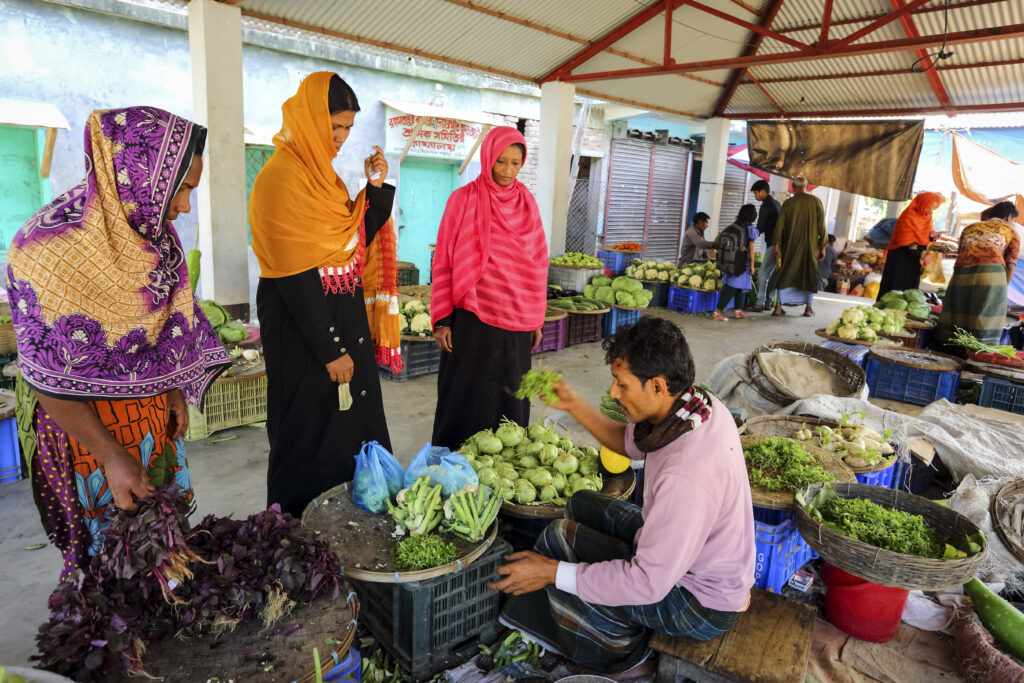
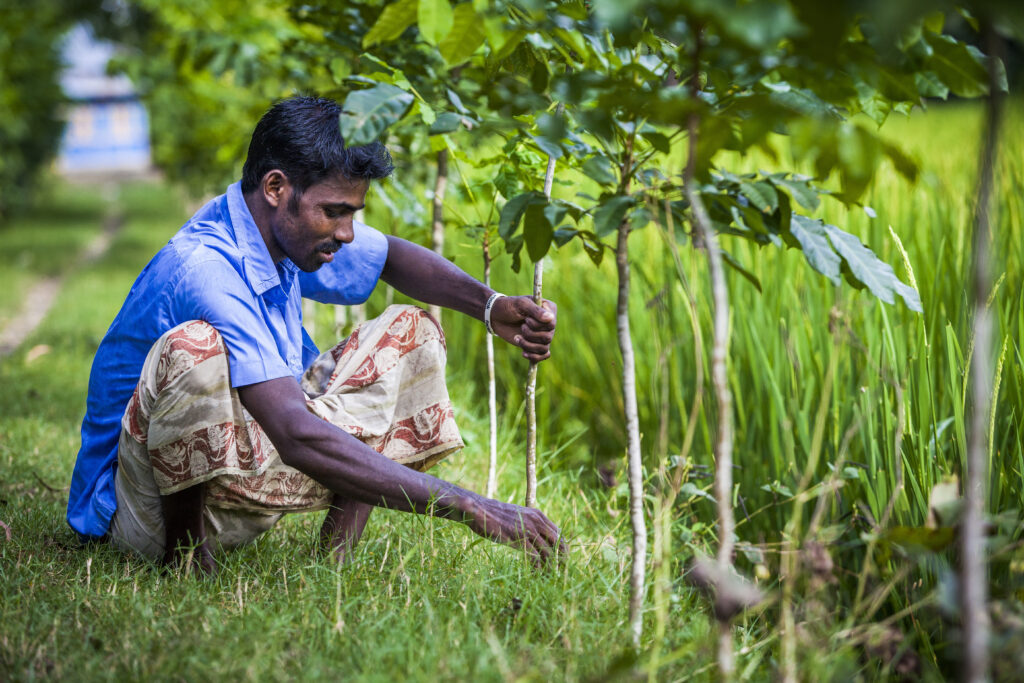

To support that, the Foresight for Food Systems Transformation (FoSTr) program is providing a flexible decision-support facility to support Bangladesh with evidence-based foresight and scenario analysis that goes along the country’s vision to work towards sustainable food systems in Bangladesh.
As part of reporting to UNFSS STM+4 (2025) and fulfilling the Honorable Prime Minister’s commitment to UNFSS, foresight analysis of the food systems will complement the data, research, risk analysis, and scenarios development for the future food systems and provide necessary guidance for food systems transformation.
Expectations of the Foresight4Food Global Workshop experience
For this year’s Global Foresight4Food Workshop, the theme is “Reframing Food Futures: Making Foresight Transformative”. What I seek from this workshop is an opportunity for cross-country learning about using foresight tools, their drawbacks, and ways for improvement for better foresight analysis, as well as areas of collaboration, partnerships, and future investments for the country’s food systems transformation. I also think this will be a wonderful opportunity to showcase how Bangladesh is transforming its food systems with its various challenges.
From a personal point of view, I expect that the learning and insight of the workshop will help me understand the food systems transformation agenda in Bangladesh. It will also help me in policy advocacy in prioritizing areas and activities that build sustainable and resilient food systems.
Another aspect of the Foresight4Food Global Workshop that I hope for is that it will create space for highly interactive dialogue, igniting creativity and sparking actionable progress on the foresight agenda, offering cutting-edge updates on foresight practice and applying foresight to country realities.
The workshop will contribute to understanding how other countries are transforming their food systems, what works and what doesn’t, what matters most, and what supports are required, etc. The workshop will be a great opportunity where you’ll be able to build networks, partnerships, investment opportunities, and investment progress tracking and implementation. Moreover, the workshop will help governments reframe some of the initiatives and prioritize them based on the political economy contexts.
All in all, it will be truly exciting to see energetic participation from food systems researchers, practitioners, and government and private sector representatives gathered under one roof to talk about making foresight transformative.
By Bram Peters – Food Systems Programme Facilitator, Foresight4Food
In the north of Kenya, on the border with Ethiopia, the landscape is expansive and dry. Pastoralism is the main source of livelihood, but to the west of this landscape is Lake Turkana, one of the largest saline desert lakes of the world. Here communities engage, some productively and others reluctantly and out of desperation, in fishing.
In March 2024, the Foresight4Food FoSTr team traveled to the fascinating Kenyan county of Marsabit to facilitate a multi-stakeholder forum to support the co-creation of the new ‘Sustainably Unlocking the Economic Potential of Lake Turkana’ programme.
In Marsabit, stakeholders from around the Turkana Lake, including fishers, traders, service providers, county government technical officers, and non-governmental organizations, came together to analyze the context and co-create future scenarios and intervention areas for a new WFP and UNESCO programme, funded by the Embassy of the Kingdom of the Netherlands.
Together with the World Food Programme and the World Food Programme Innovation team, the FoSTr team held a highly interactive and productive three-day workshop. As most stakeholders mainly spoke Kiswahili, we switched to short presentations with much emphasis on interactive group work. On the first day, the workshop focused on contextual understanding of the Lake Turkana food system as well as the Marsabit county livelihoods, using the Rich Picture mapping exercise. Participants together drew the food system, the geography of the lake, but also the stakeholders, activities, key relations and dynamics.
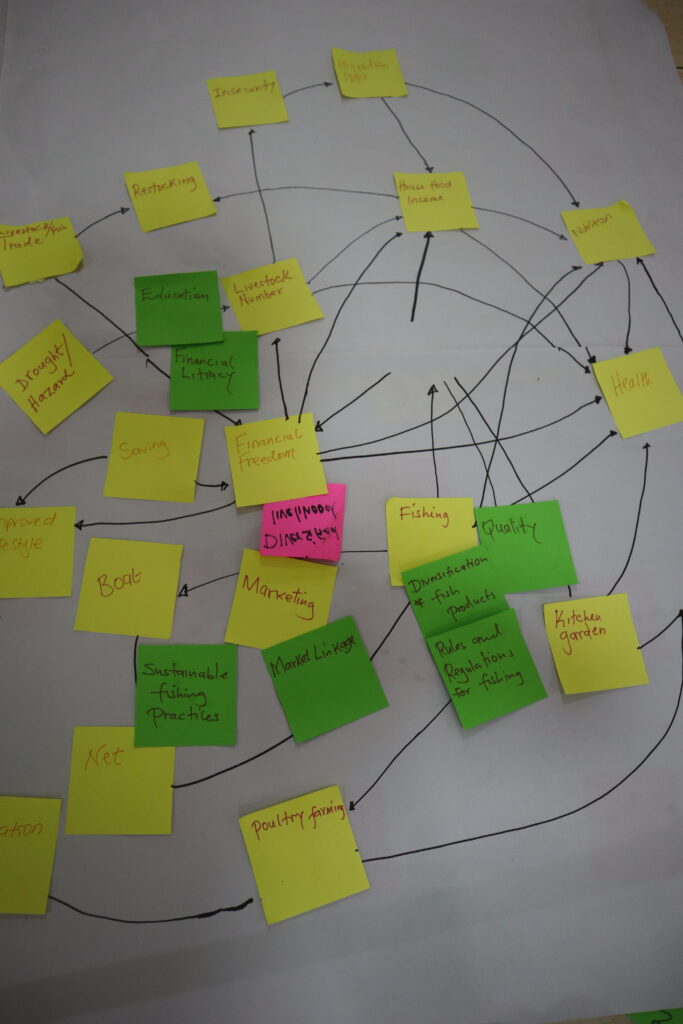
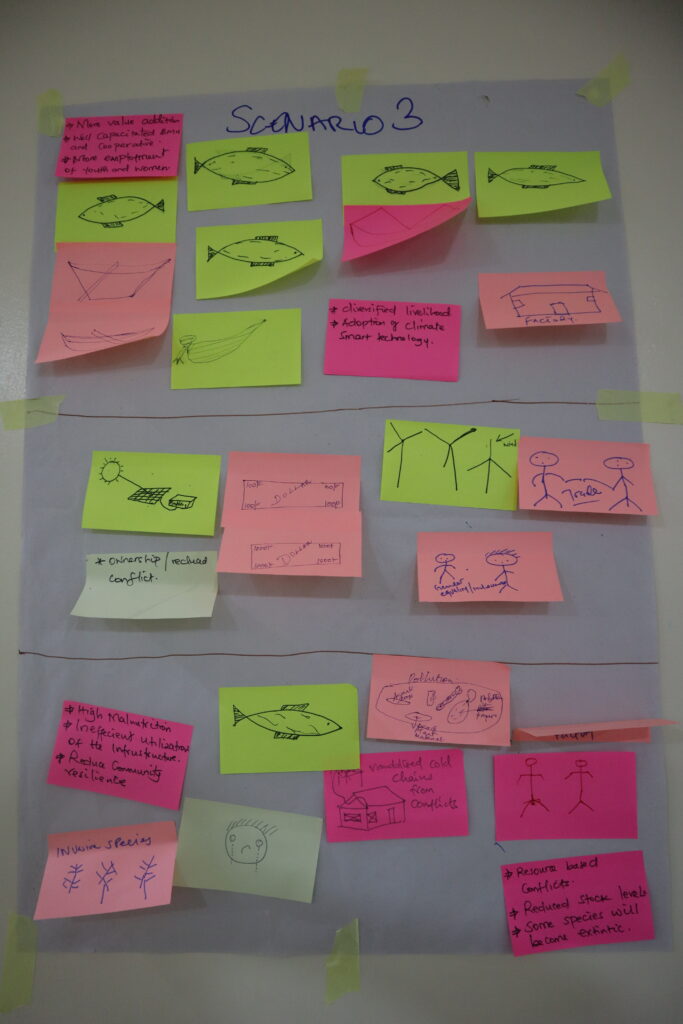
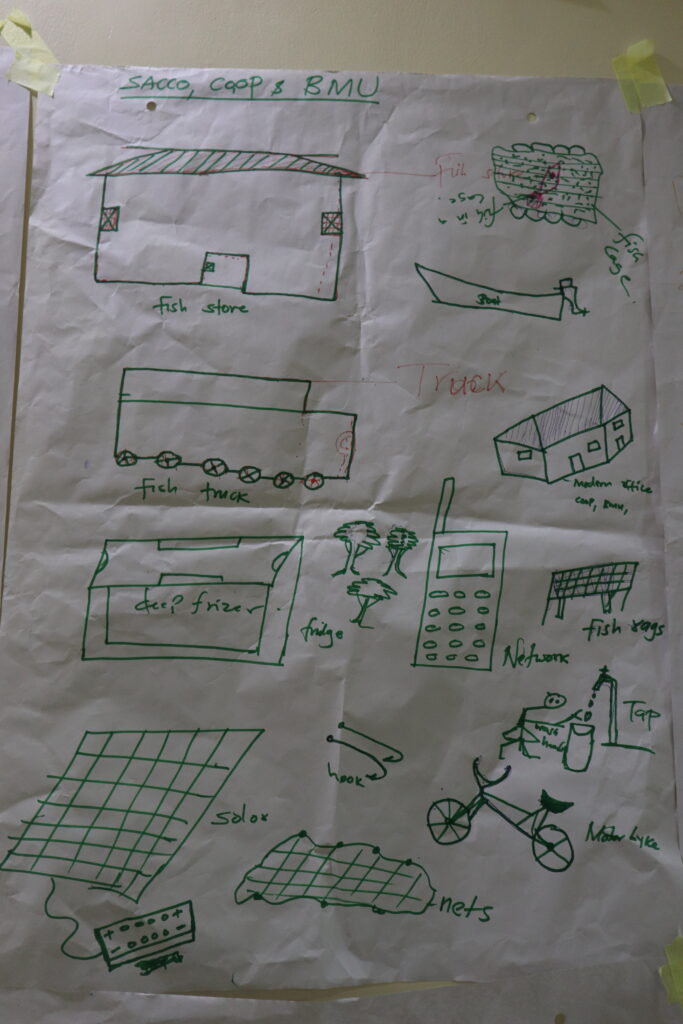
On the second day, the groups presented their deep knowledge of the context to each other and elaborated on this. Workshop participants tackled key trends shaping the food and livelihoods system: groups discussed how various themes (for example: lake water levels, fish stocks to income sources, conflict, and education) changed over time and what they expect to happen 10 years into the future. Important in this discussion is their analysis of what driving issues would influence change in the future.
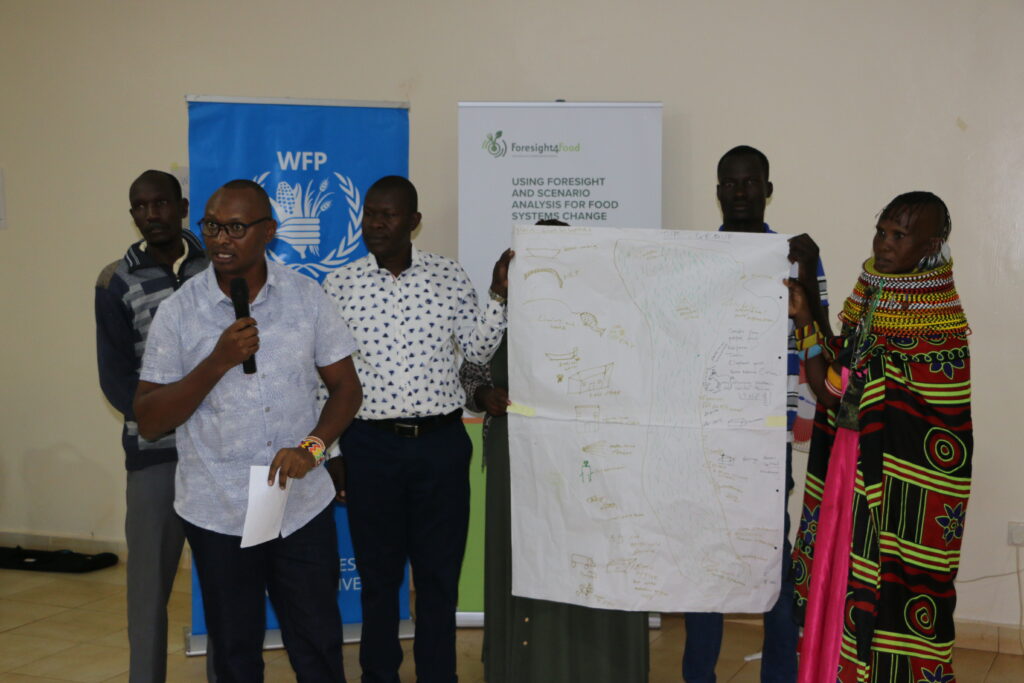
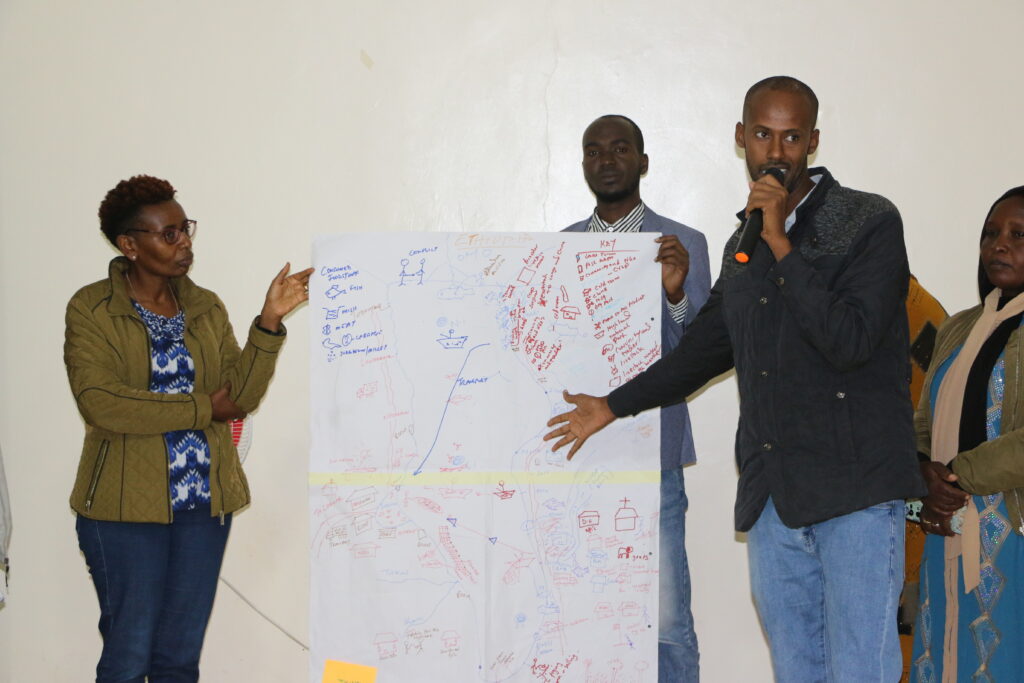
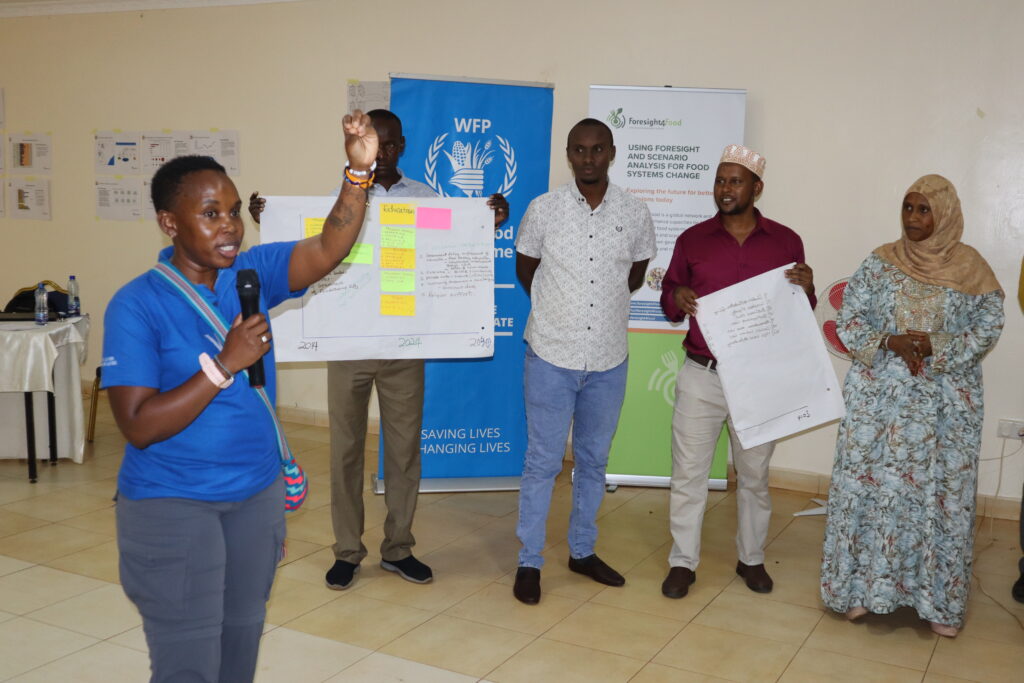
5 scenarios were created for the future regarding the fisheries sector and supporting livelihoods, as well as an in-depth discussion on key entry points for intervention in the system. These scenarios had names that described these futures succinctly:
- ‘Tumaini Paradiso’, a future with a growing fishing sector, inclusive benefit sharing and sustainable natural resource management;
- ‘No retreat, no surrender’, a situation in which the benefits of a growing fisheries sector are controlled by a few;
- ‘Short gain, long pain’, a scenario where the fisheries sector grows and livelihoods improve around the lake, but the environment is not maintained;
- ‘Gasping blue economy but others rise’, is a future where the fisheries sector remains marginal for communities, but other sectors are developed that also contribute to inclusive development and environmental sustainability
- ‘Darkness in life’, a bleak outlook where none of the envisioned sustainable economic development around the lake delivers and where climate resilience is low, and conflict is rife.
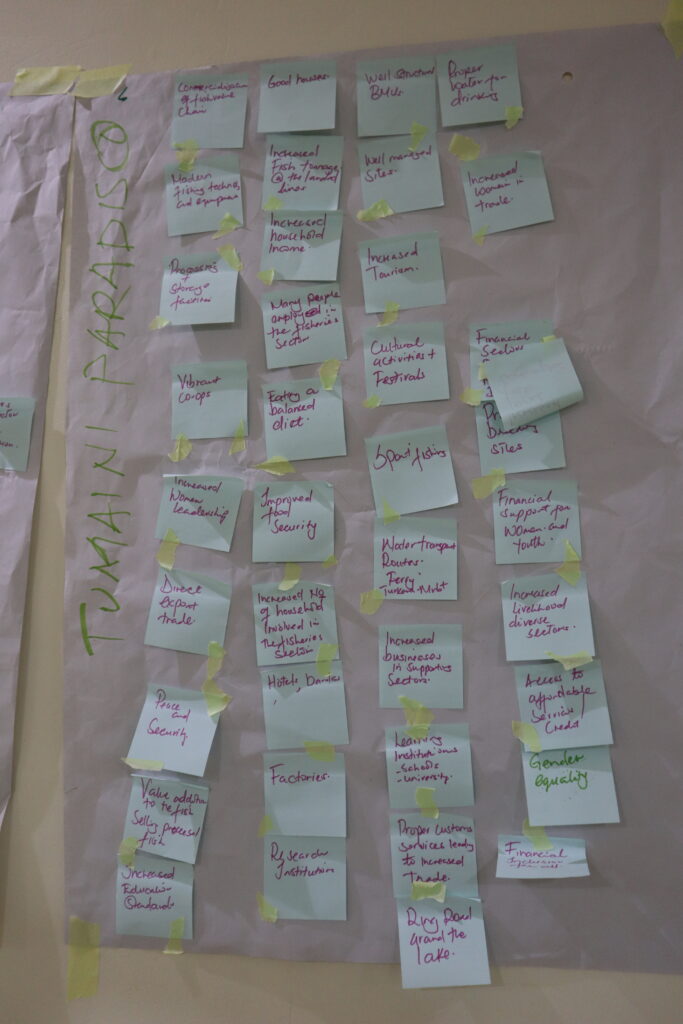
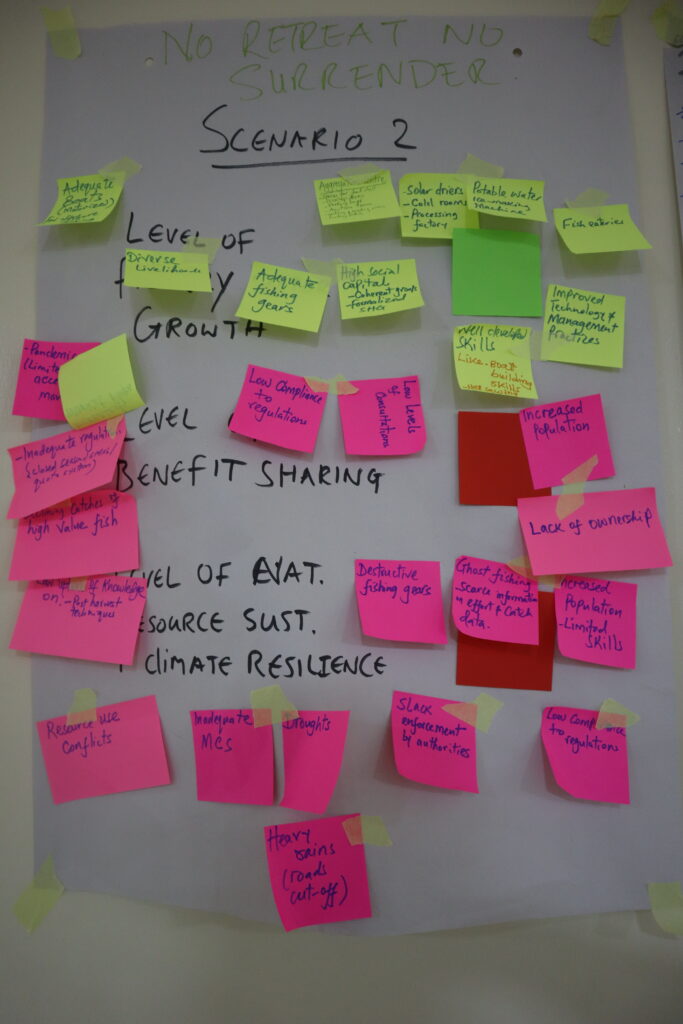
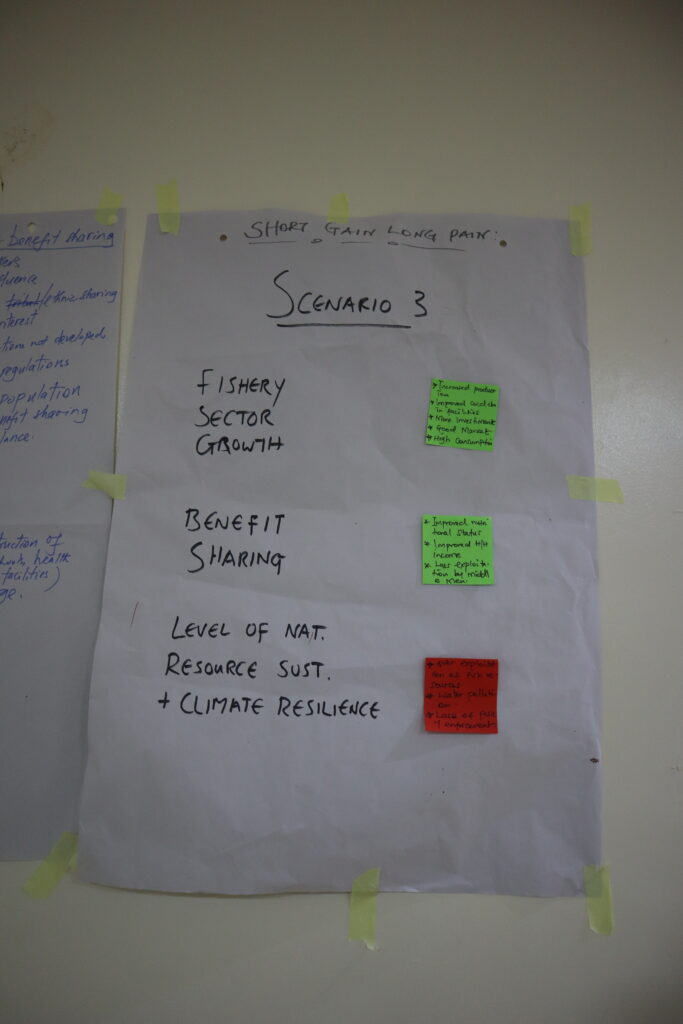
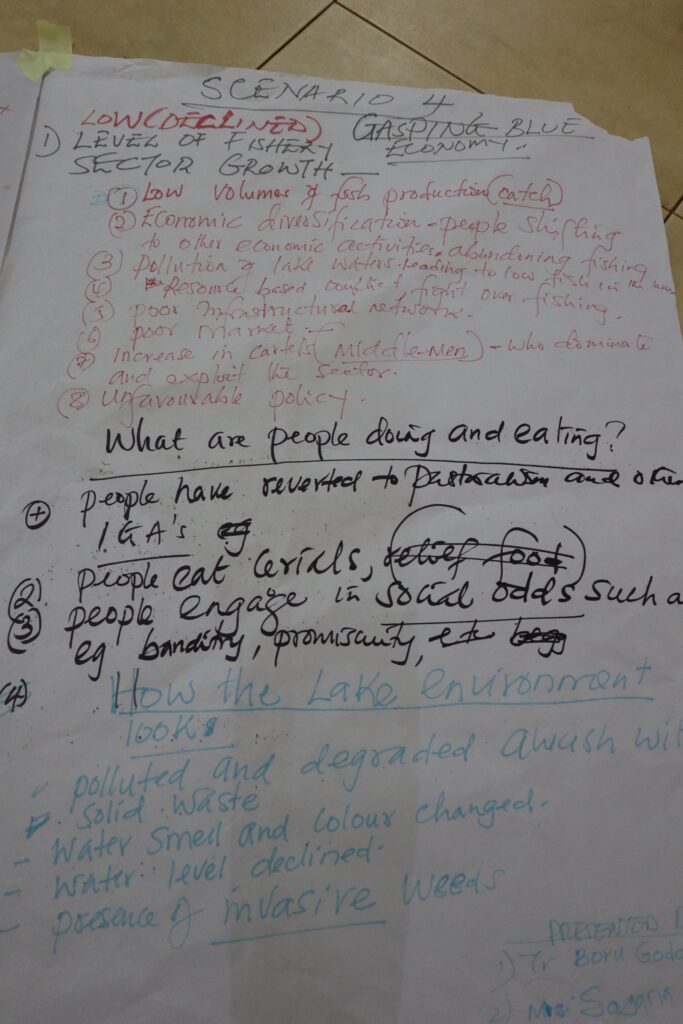
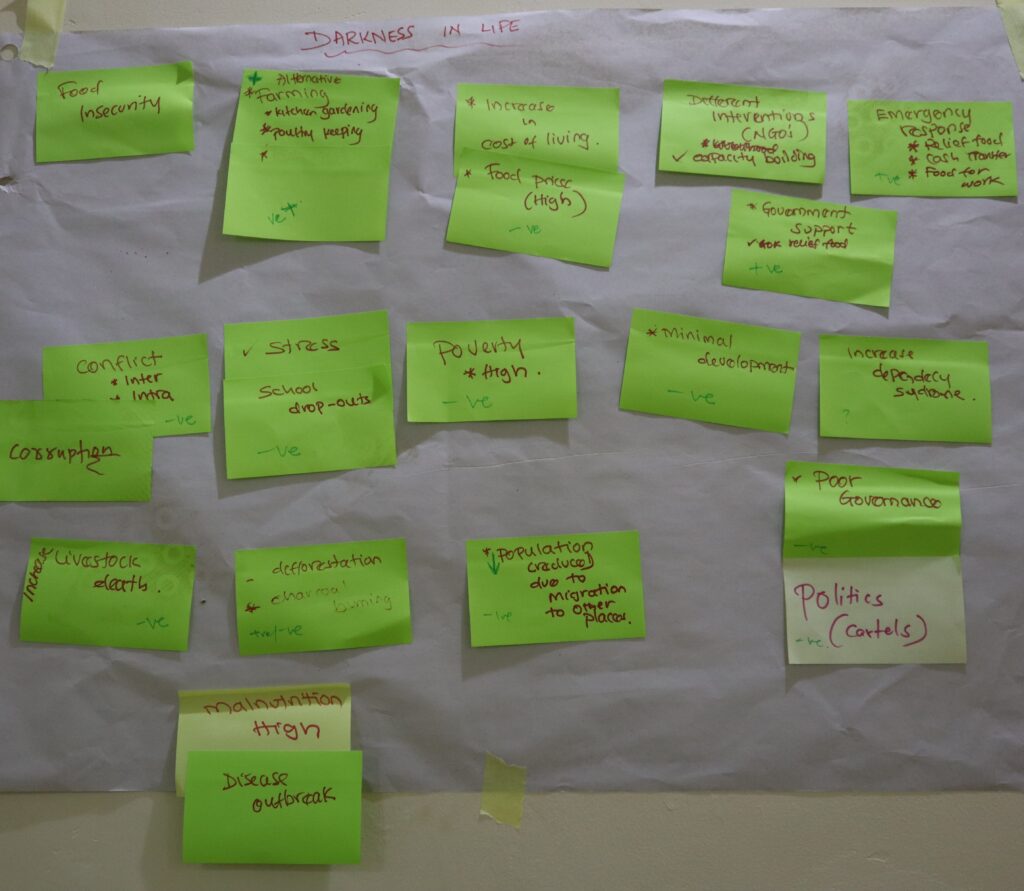
Different stakeholders participating in the workshop had different opinions on the likelihood of certain scenarios emerging. Some imagined the situation worsening, while a few viewed the future more positively. These reflections clearly showed a combination of outlook of participants as well as the signals they interpret from the current situation and the trends seen now. Interestingly, none of the stakeholders felt the ‘Paradiso’ scenario was likely, showing that the programme needs to be modest in its systemic ambitions, but also be ready to do things very differently. These scenarios showed what could become a very relevant frame of reference to the stakeholders as well as the programme implementors.
On the last day of the workshop, participants explored a common vision for the future, and how the food system is currently working. This led stakeholders to have a first try at exploring what is needed to change that system toward the common vision.
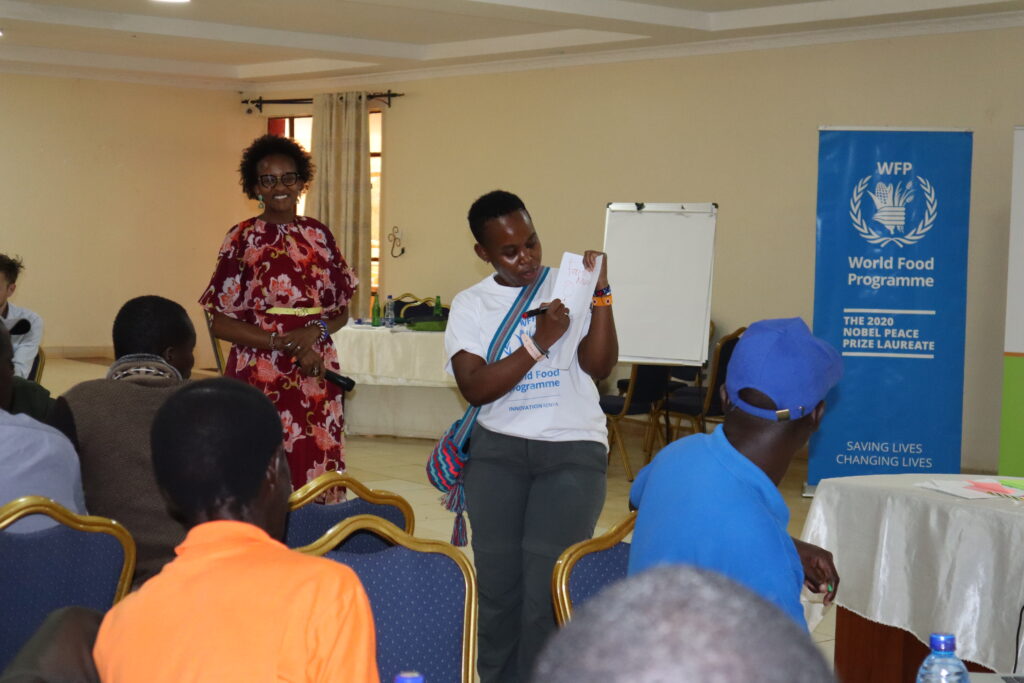
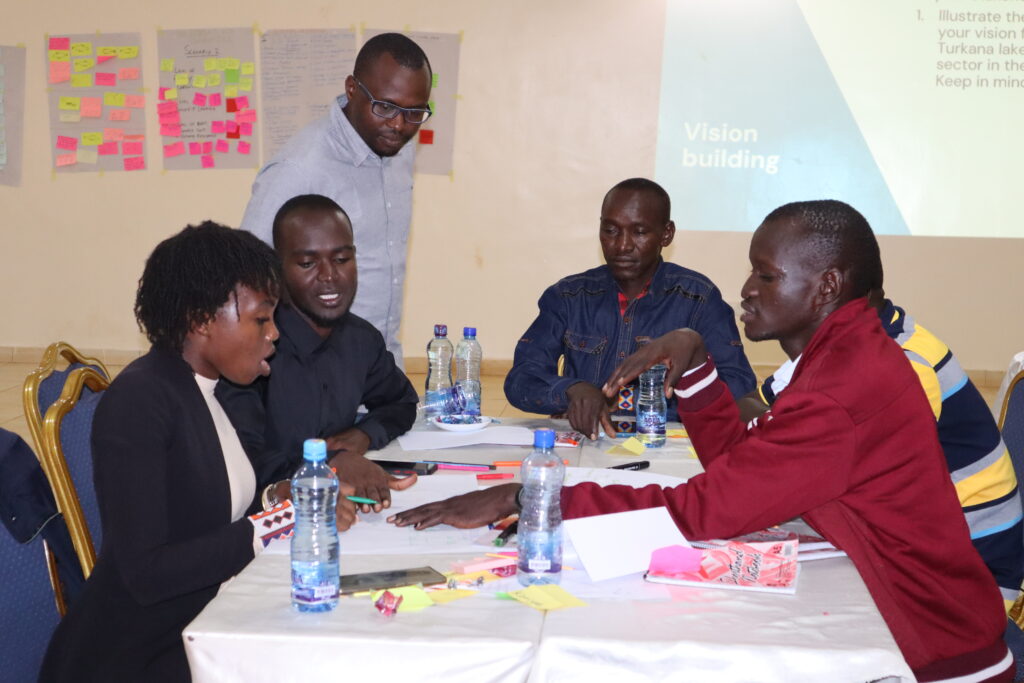

At the end of the workshop, I felt highly positive about these fruitful discussions that enabled participants to think about what might happen to the Marsabit food system in the years to come, and what factors would influence these changes. In addition to that, the insights gathered through the multi-stakeholder forum are expected to not only support the inception phase of the programme but will also support multi-stakeholder engagement throughout the programme.
The Foresight4Food FoSTr team will continue to support the World Food Programme team in realizing the ‘Sustainably Unlocking the Economic Potential of Lake Turkana’ programme inception phase. A follow-up workshop will take place in Turkana County from March 25 to 28, with stakeholders from that side of Lake Turkana.
By Zoë Barois
To support the lasting and valuable development of any multi-stakeholder network, it is important to explore its perceived values and positioning from the perspective of various key and transdisciplinary stakeholders. In line with this concept, five members from the Advanced Masters International Development (AMID) Programme at Radboud University including Emma John, Guusje Dijkstra, Meg van Grinsven, Nadia Rinaldi, and Zoë Barois, collaborated to explore stakeholder perceptions on the perceived values of the Foresight4Food Initiative and the risks it faces when participating in multi-stakeholder networks.
The team conducted seven interviews with foresight experts and practitioners from private, governmental, research, and multilateral organizations, in addition to experts in multi-stakeholder partnerships. Some interesting findings came up in the interviews that led to the development of several guidelines.
Perceived Values of Foresight4Food
The interview participants appreciated that the Foresight4Food Initiative connects stakeholders to (new) players in the field and enables their work to be critically examined by specialists. Being able to harness expertise in the field of foresight and apply this to food system transformation was highlighted to facilitate a deeper understanding of the suitability of foresight tools in diverse contexts.
Additionally, the interviewees highlighted Foresight4Food’s unique value is that it is one of the few initiatives working on food system transformation on a global level, as opposed to most initiatives that focus on national or regional scopes.
Foresight4Food’s deliberate focus on the processes (rather than the product) of forecasting future scenarios was emphasized as a value in itself as it is a strategic tool for food systems transformation.
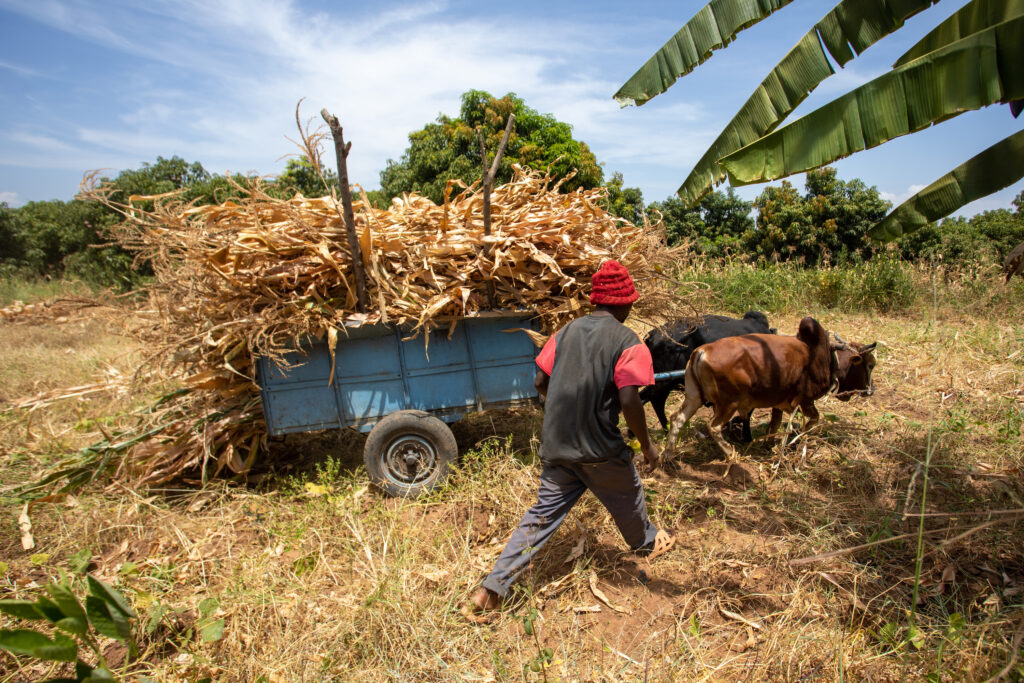
An interviewee highlighted the benefit of Foresight4Food’s open-access resource platform and their ability to provide a neutral meeting space that facilitates cross-learning and a deeper understanding of foresight and food system trends among stakeholders.
“…we see it [Foresight4Food] as a great forum to exchange learning, for example, we just took the exploratory scenario planning process and customized it for use with multi-stakeholder partnerships… this is a tool that already existed that we kind of adapted and would love to share how that works so other people can pick that up…’’ – Foresight Practitioner
Risks Faced by Foresight4Food: Positionality & Durability
During the multi-stakeholder interviews, several thematic risks emerged relating to Foresight4Food’s durability and positionality within the active foresight landscape.
The long-term thinking required to envision the outcomes of Foresight4Food poses challenges in terms of sustainability as this makes it difficult for organizations to invest in the initiative due to investors’ often short-term vision and the need to “show results as quickly as possible” – Foresight Expert — a common challenge faced by many organizations in the development sector.
In relation to Foresight4Food’s positionality, the initiative faces the risk of being duplicated by similar organizations and, consequently, being “squeezed out by the big players if they feel that we are an irritant on the side of what they consider to be their patch” – Foresight Expert
Lastly, Foresight4Food faces the risk of not being “democratised enough and sublevel enough” to truly get involved with the root causes of the food system issues. This stems from the current engagement of true experts in the field and thus emerges as an ‘’elite network’’ initiated by two high-profile universities. This lack of inclusivity is further emphasized by interviewees “not capable of being inclusive we are going to fail giving to those that actually can benefit the most from our work” – Foresight expert
Subsequently, one of the main challenges of F4F is effective outreach and engagement with stakeholders.
Proposed Guidelines
Taking into account Foresight4Food’s vision and the thematic risks which emerged from the multi-stakeholder interviews, several guidelines were generated aiming to support the sustainable and valuable development of Foresight4Food’s multi-stakeholder network.
1. Foresight4Food’s Positionality
Enhancing F4F’s positionality is crucial for the initiative to find its niche. Therefore, the following guidelines are suggested:
- Conducting a needs assessment of the current network members can enable F4F to identify and prioritize their needs.
- The outcomes from the needs assessment can provide an informed direction to perform a visioning exercise. Matchmaking between desired visions and the long-term forecast
- Continuously update the existing mapping of foresight initiatives across the food system. This can be used to perform a competitor analysis to assess the existing gaps in the foresight and food systems field and formulate associated research questions.
- Facilitating smaller partnerships amongst F4Fs members, was highly valued by an interviewee thus F4F could link initiatives conducting complementary activities identified in their foresight initiative mapping, further enhancing their value.
2. Sustainability: Foresight for Foresight4Food
To ensure Foresight4Food’s sustainability and longevity, Foresight4Food must become more attractive to investors:
- ‘Foresight for Foresight4Food’: generating potential future scenarios for F4F to clarify what outcomes and impact F4F envisions in its short- and mid-term futures.
- This can be further enhanced and formulated into concrete goals by a Monitoring, Evaluation & Learning (MEL) expert, who can contextualize F4F’s Theory of Change towards each of the five FoSTr countries, providing concrete outcomes, which are actualized for funders to grasp and support.
- Develop a funding strategy to generate a diversified funding portfolio to ensure financial flow from a variety of sources.
- Attract funding from the private sector and from philanthropy as they are harboring the most financial power within the field.
- Consider transferring core operations and leadership to stakeholders in target operational areas (i.e., the FoSTr countries). This would require creating an inclusive roadmap for phasing-out and phasing-in new or alternative network partners.
3. Inclusivity & representativeness
To make F4F more inclusive, the following recommendations are provided:
- Stakeholder Characteristics and Roles Matrix to map to identify stakeholders who are not yet on board or have a low influence within the network.
- Introduce a ‘second circle’ around the steering committee to include a diversified set of stakeholders in the decision-making processes. This second circle could include farmers, youth representatives, and/ or representatives from the five FoSTr programme focus countries.
- Generate a sense of ownership amongst second circle members through co-creation
To conclude
Foresight4Food Initiative is striving to develop and strengthen its network among foresight practitioners and different stakeholders. However, it gets challenging for any organization to work in a multi-stakeholder environment. Therefore, an exploratory look at the perceived values and positionality becomes imperative.
Foresight4Food, under its FoSTr programme is working in five countries across Africa, Asia, and the Middle East, conducting foresight orientation, stocktaking, capacity building, and exploring ways to transform the country’s food systems. Thus, making it the right time to explore sustainable positioning from a stakeholder’s perspective.
In October 2022, Foresight4food hosted a CFS side event on “Foresight and Future Scenarios for Food Systems Transformation – Building Resilience and Fostering Adaptation to Protect Against Future Crises”. The event was held jointly with the International Fund for Agricultural Development (IFAD), the Forum for Agricultural Research in Africa (FARA) and the CFS High Level Panel of Experts on Food Security and Nutrition (HLPE – FSN).
The event highlighted the importance of taking longer-term perspectives on food systems transformation through the use foresight and scenario analysis. The work of the Foresight4Food Initiative was outlined and a new programme “Foresight for Food System Transformation – (FoSTr)” was launched.
Patrick Caron, International Director at Montpellier University of Excellence / CIRAD opened the event and highlighted the potential of foresight for supporting food systems transformation. He emphasised that foresight is not about trying to predict the future but rather to prepare for a range of different future scenarios and to understand the implications of these for different stakeholder interests. Patrick introduced the work of Foresight4Food, which is promoting and supporting the use of foresight and scenario approaches for food systems analysis and transformation.
The event was moderated by Jim Woodhill, Lead of the Foresight4Food Initiative. He introduced the building blocks of an approach to foresight for food system transformation which has been developed by Foresight4Food. Central to this approach is identifying key trends and critical uncertainties which may influence the future of the entire food system. He indicated how Foresight4Food has been developing and how its overall approach is being tested through work in Africa and Asia. This contributes to the Foresight4Food objectives of supporting a community of practice, a brokering foresight work and developing a deeper understanding of foresight methodology and tools.
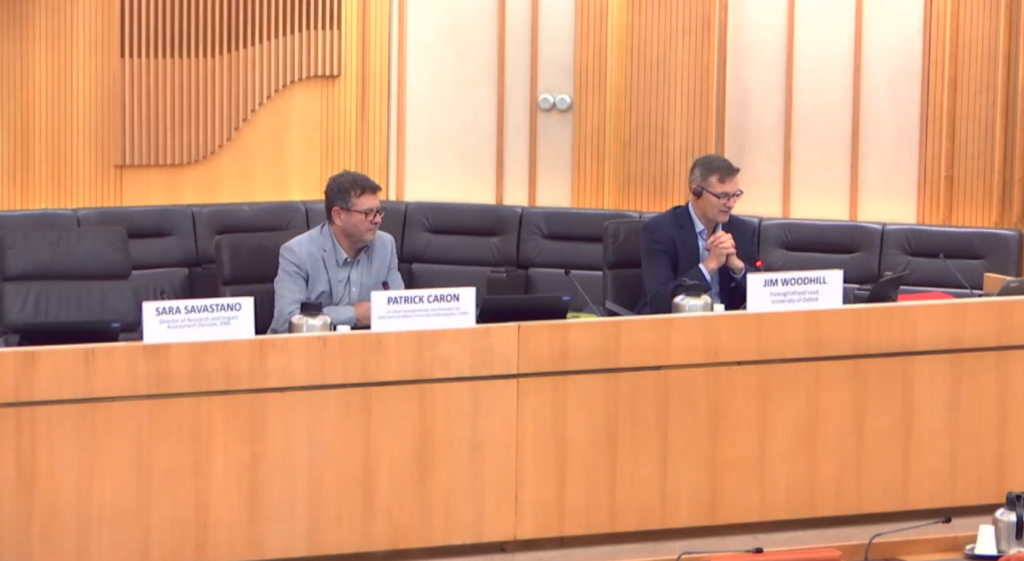
Abdurazak Ibrahim, Cluster Lead, Institutional Capacity and Future Scenarios, Forum for Agricultural Research in Africa (FARA) introduced the work of the African Foresight Academy in institutional capacity building for foresight and scenarios. He outlined the objectives of Academy and introduced current initiatives. This includes running an AgMOOC on foresight for which 300 people have enrolled and which has been produced in partnership with Foresight4Food.
Akiko Suwa-Eisenmann, a member of the HLPE-FSN, discussed the most recently presented HLPE-FSN report no. 17 on “Data collection and analysis tools for food security and nutrition” which focuses on enhancing data for effective, inclusive and evidence-informed decision making. Akiko emphasised that the current food crisis further illustrates that it is critical to have reliable and up-to-date data on food and nutrition security. Challenges to be faced include enhancing data literacy, dealing with the complexity of food systems across scales, filling critical data gaps, and synthesising and presenting data so it is useful for decision making. Akiko noted that “foresight needs to be data informed and that means not only data collection and analysis but also translating data into insights, and dissemination for making decisions, and that foresight is key in these processes of bringing data to the public debate”. She also highlighted the value of linking the work of the HLPE and that of Foresight4Food.
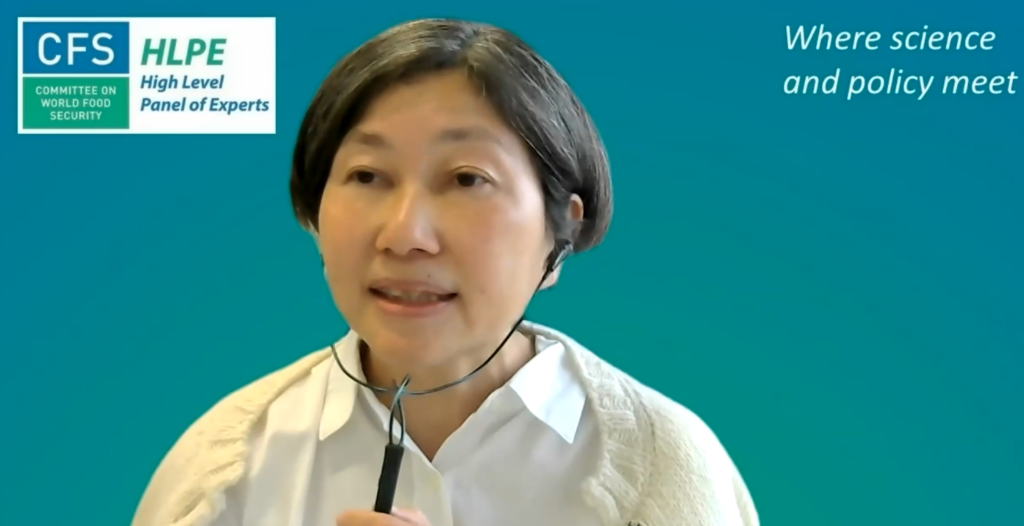
John Ingram, Lead of the Food Group at the Environmental Change Institute, and Associate Professor and Senior Research Fellow at Somerville College, University of Oxford, introduced and launched the new Foresight for Food System Transformation (FoSTr) Programme. This will be a three-year initiative helping to take forward the work of Foresight4Food with engagement in five focus countries across Africa, Asia and the Middle East. FoSTr is funded by the Government of the Netherlands, as a grant through the International Fund for Agricultural Development (IFAD). He talked about the collaborative nature of this work at both national and global levels and its intention to support a growing community of practice across foresight providers and users.
Read Also: Successful launch of the FoSTr Programme in Jordan during fruitful roundtable on future food systems
Sara Savastano, the Director of IFAD’s Research and Impact Assessment Division, discussed the need to understand how food systems work in the selected countries where FoSTr will operate. She noted the importance of foresight as a key contributor for designing effective investment projects which tackle the longer-term challenges of building resilience into food systems.
Ravi Khetarpal, Executive Secretary of Asia Pacific Association of Agricultural Research Institutions (APAARI), and Chair of the Global Forum for Agricultural Research (GFAR) underlined the continued importance of the agri-food sector for security and development across the Asia Pacific. He emphasised the critical need for multi-stakeholder platforms at national and local levels to help drive the needed innovation for transforming food systems. He saw foresight and the Foresight4Food initiative as a valuable contribution to such processes and welcomed its work in the region. To achieve sustainable and resilience food systems he called for more evidence-based policy making, which relies on good data and the type of integrated qualitative and quantitative analysis which can be offered by foresight.
Sara Mbago-Bhunu, the Director of IFAD’s East and Southern Africa Division, highlighted the current crises across the region being driven by increasing energy and food prices, along with climate impacts. She welcomed the FoSTr initiative and noted the critical need to transform food systems for long-term resilience while also tackling the humanitarian relief demands in the short-term. She emphasised the historical link between high food prices and social unrest and reminded the audience of the huge shortfall in investment funds for the agri-food sector. She hoped that “the FoSTr program as you have described here can do the modelling and forecasting to build up capacities in this space for informed policy making to invest in sustainable and circular management [of food systems]”.
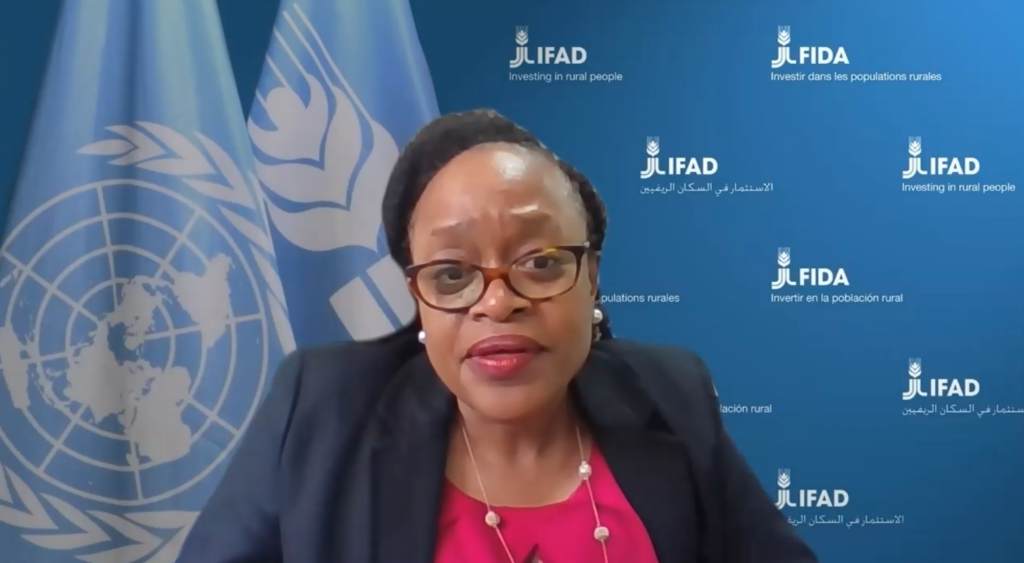
Winnie Yegon, a Horticulture Fellow with the African Food Fellowship, and food systems expert with the Food and Agriculture Organisation (FAO) explained how training in food system foresight provided by the Followship Programme, has enabled new perspectives on how to bring about change in food systems. In particular, she noted the value of an integrating perspectives that brings stakeholders together to make sense of available data.
Herman Brouwer, Senior Advisor for Multi-Stakeholder Collaboration at the Centre for Development Innovation (CDI), Wageningen University and Research, highlighted two key implications from the discussion, on one hand the need for reliable data and on the other the need for processes which enable collective sense making. He noted that helping to bring enhanced literacy on data and foresight processes is a valuable contribution which can be made by Foresight4Food and the FoSTr Programme. In particular, he emphasised the need for collaboration between different stakeholder across the food system to enable change, and that foresight can make a valuable contribution to such collaborative processes by creating shared understanding of future risks and opportunities.
Key Messages
- The current crisis in energy and food prices underscores the need for food systems transformation with a central focus on resilience.
- Transforming food systems requires long-term perspectives and futures thinking which can be supported through foresight and scenario analysis.
- Foresight is most valuable when it can integrate qualitative and quantitative methods and engage stakeholders from across the food system.
- Foresight4Food offers a network and platform for sharing experience and methodology on foresight for food systems change, and for supporting capacity development.
- Foresight needs good data on food security and nutrition, however, there remain large gaps in data availability and limited literacy on how to collect and analyse data.
- The Foresight for Food System Transformation (FoSTr) Programme will provide three years of support for the work of Foresight4Food and enable in-depth work in five focus countries.
- Enhancing food systems and foresight literacy across key players in food systems is increasingly recognised as an important element in being able to transform food systems and take forward national food systems transformation pathways.